National Joint Council
- Gen Sec Annual Report - 2022-23
- NJC Labour Relations Training Sessions for the LR Community
- NJC Recognition
- Photo Gallery
- Current Committee Activities
- NJC Constitution
- NJC By-Laws
- NJC Co-Development Process
- NJC Results for Employees
- Organization Chart
- NJC Membership
- NJC Statement of Values
- Disability Insurance Plan
- Public Service Dental Care Plan
- Public Service Health Care Plan
- Coordinators
- Search Decisions
- Information Notice - Change in Grievance Practice
- Grievance Process and Procedures
- Publications
- NJC Communiqués

Travel Directive
Note: Public Service employees must contact their Designated Departmental Travel Coordinator with their questions.
Communiqués Other related documents
- Collective agreement
- Grievance procedure
- Effective date
- Purpose and scope
- Application
- Definitions
- 1.1 Authorization
- 1.2 Loyalty programs
- 1.3 Overpayments
- 1.4 Receipts
- 1.5 Responsibilities
- 1.6 Suppliers, services and products
- 1.7 Travel advances
- 1.8 Travel forms
- 1.9 Workplace change (applies within the headquarters area only)
- 2.1 Insurance plans and compensation
- 2.2.1 Crown Vehicles
- 2.2.2 Rental Vehicles
- 2.2.3 Private Motor Vehicles
- 3.1.1 Accommodation
- 3.1.2 Additional business expenses
- 3.1.3 Bottled water
- 3.1.4 Currency exchange
- 3.1.5 Dependant care
- 3.1.6 Home communication
- 3.1.7 Incidental expense allowance
- 3.1.8 Insurance
- 3.1.9 Meals
- 3.1.10 Rest periods
- 3.1.11 Transportation
- 3.1.12 Weekend travel home
- 3.1.13 Weekend travel - alternatives
- 3.2.1 Accommodation
- 3.2.2 Additional business expenses
- 3.2.3 Bottled water
- 3.2.4 Currency exchange
- 3.2.5 Dependant care
- 3.2.6 Home communication
- 3.2.7 Incidental expense allowance
- 3.2.8 Insurance
- 3.2.9 Meals
- 3.2.10 Rest periods
- 3.2.11 Transportation
- 3.2.12 Weekend travel home
- 3.2.13 Weekend travel - alternatives
- 3.3.1 Accommodation
- 3.3.2 Additional business expenses
- 3.3.3 Bottled water
- 3.3.4 Currency exchange
- 3.3.5 Dependant care
- 3.3.6 Home communication
- 3.3.7 Incidental expense allowance
- 3.3.8 Insurance
- 3.3.9 Meals
- 3.3.10 Rest periods
- 3.3.11 Transportation
- 3.3.12 Weekend travel home
- 3.3.13 Weekend travel - alternatives
- 3.4.1 Accommodation
- 3.4.2 Additional business expenses
- 3.4.3 Bottled water
- 3.4.4 Currency exchange
- 3.4.5 Dependant care
- 3.4.6 Home communication
- 3.4.7 Incidental expense allowance
- 3.4.8 Insurance
- 3.4.9 Meals
- 3.4.10 Rest periods
- 3.4.11 Transportation
- 3.4.12 Weekend travel home
- 3.4.13 Weekend travel - alternatives
- 4.1 Escort Officers
- 4.2 Ships Officers / Ships Crews
- 4.3 Special transportation needs
- 5.1 Death while in travel status
- 5.2 Emergencies, illnesses and injuries while in travel status
- Appendix A - Guide to Insurance Coverage for Employees on government Travel
- Appendix B - Kilometric Rates - Modules 1, 2 and 3
- Appendix C - Allowances - Modules 1, 2 and 3
- Appendix D - Allowances - Module 4
- Appendix E - Blanket travel authority templates - Module 1 - Travel within headquarters area
- Appendix E - Module 2 - Travel outside headquarters area - no overnight stay
- Appendix E - Module 3 - Travel in Canada and continental U.S.A. - overnight stay
- Appendix E - Module 4 - International travel - overnight stay
- Appendix F - Sample declaration
- Skip to main content
- Skip to "About this site"
- Search and menus
Policies, directives, standards and guidelines
Search or browse the entire collection of Treasury Board approved policies and related instruments for organizations across the Government of Canada.
Find a policy instrument
Enter keywords to find policies, directives, standards and guidelines.
Browse policy instruments
Browse instruments by policy topic, people management.
Management of a high-performing, diverse and inclusive workforce and a modern, healthy and respectful work environment to achieve business objectives. People management includes compensation, organization and classification, labour relations, pensions and benefits, executive management, values and ethics, diversity and inclusion, occupational safety and health, wellness, performance and talent management, and employee recourse.
Government security
Protection of government programs and services, along with the people, information and assets that support them from threats and compromise.
Access to information and privacy
Protection of individual's privacy and personal information held by the government. Access to information that is contained in government records.
Assets and acquired services
Sound stewardship and the achievement of best value through life-cycle management of assets and acquired services, including investment planning, and the management of projects, programmes, procurement, real property and materiel.
Communications and Federal Identity
Management of communications, federal identity, managing government communications and requirements for advertising, public opinion research, social media and web communications
Financial management
Financial resources of the Government of Canada are well managed in the delivery of programs to Canadians and safeguarded through balanced controls that enable flexibility and manage risk.
Results, Evaluation, and Internal Audit
Improving performance and decision making by assessing risks, measuring and evaluating results, and providing management oversight.
Service and digital
Supports the integrated management of service delivery, information and data, information technology, and cyber security in the digital era.
Official languages
Implementation of the Official Languages Act and equality of status of English and French in federal institutions through communications, services, and language of work.
Transfer payments
Informs the design and delivery of transfer payment programs.
Language selection
- Français fr
Directive on Travel
Version number: 2.17
Version date: April 1, 2024
Upon request, this corporate policy instrument (CPI) is available in multiple formats for individuals with a visual impairment (email Multiple Media-PAB (CRA) ).
Table of contents
- Effective date
- Application
- Related corporate policy instruments
- Objectives and outcomes
- Requirements
- Roles and responsibilities
- Review and assessment
- Version history
- Definitions
1. Effective date
The Directive on Travel received Board of Management (Board) approval and came into effect on June 16, 2020 (Board Resolution #2020-2021-06).
This directive replaces the 2013 Travel Directive and the 2006 Travel Loyalty Programs Policy.
For the version history of this document, see section 11 .
2. Application
The directive applies to employees and other persons travelling on Canada Revenue Agency (CRA) business, such as Members of Parliament, the Minister’s exempt staff and contractors, and is mandatory to follow. It does not apply to those persons whose travel is governed by other authorities, such as the Minister.
The term "employees" has been deliberately used throughout the directive to distinguish entitlements that apply to strictly employees. Sections pertaining to "travellers" apply to contractors and other persons travelling on CRA business. For the purposes of this directive, the term employee will encompass members of the Board.
The Code of Integrity and Professional Conduct highlights the rules, and describes the values, that guide CRA employees in their work. The Code, along with the CRA Foundation Framework for Corporate Policy, sets out the requirement to follow CPIs.
Consequences of non-compliance for employees: failure to comply with CPIs may result in corrective measures, including administrative and disciplinary action.
To help interpret and implement this directive, key terms are defined in the Definitions section.
3. Related corporate policy instruments
This directive flows from the Policy on Financial Management and Financial Administration.
This directive should be read in conjunction with the Directive on Pre-approval of Travel, Hospitality, Conferences and Event Expenditures.
For any other related CPIs, see References .
4. Overview
This directive sets out the financial administration requirements for the reimbursement of reasonable expenses necessarily incurred by travellers on CRA business.
The kilometric rates and meal allowances set out in this directive are those guided and established by the National Joint Council (NJC). While this directive is guided by the NJC, the entitlements of the employees will be determined in accordance with the provisions of this directive.
The Canada Revenue Agency Act (CRA Act) provides the authority for the CRA to set its own policy instruments for certain financial administration activities. These activities are listed in the Policy on Financial Management and Financial Administration in Appendix A: CRA specific activities under financial administration. This authority is reflected in this directive.
Travel entitlements under the requirements of the Directive on Relocation are not covered under this directive.
Executive groups, the Board of Management members, the Commissioner and Deputy Commissioner are provided special travel authorities guided by Treasury Board's Special Travel Authorities as per Order-In-Council (number P.C. 1997-1810).
Headquarters area, as referred to in this directive, pertains to the area surrounding the traveller's workplace having a perimeter that is at a distance of 16 km from the workplace, measured by the most direct, safe and practical road route.
5. Objectives and outcomes
5.1 objectives.
5.1.1 - To ensure fair and consistent treatment of employees and other persons travelling on CRA business to fulfill the CRA's mandate.
5.1.2 - To ensure the entitlements of the travellers do not constitute income or other compensation that would open the way for personal gain.
5.2 Outcomes
5.2.1 - Effective governance and oversight over the financial administration of travel entitlements.
5.2.2 - The CRA travel expenditures are managed efficiently and effectively in a fashion that will withstand audit and public scrutiny.
5.2.3 - The most economical, environmental and practical travel arrangements are selected.
6. Requirements
6.1 authorization.
6.1.1 All CRA travel must be pre-approved as per the requirements of the Directive on Pre-approval of Travel, Hospitality, Conferences and Events.
6.1.2 All travel is approved in accordance with the Delegation of Spending and Financial Authorities Matrix for Agency Activities.
6.1.3 Sustainable travel options should be considered during the pre-authorization of travel arrangements.
6.1.4 Travellers will not be paid for travel expenses related to travel for personal reasons.
6.2 Travel advances
6.2.1 A provision of an advance is provided to cover travel expenses where government approved services or products are not prepaid or when an employee on CRA business travel chooses not to use a Designated Travel Card (DTC).
6.2.2 Employees will be provided with a travel advance only if all overdue advances have been accounted for.
6.2.3 Contractors are not entitled to travel advances.
6.3 Workplace change
6.3.1 When there is a permanent workplace change such as displacement resulting from a staffing action, the employee is not entitled to travel expenses between the residence and the new workplace.
6.3.2 When an employee is asked to report from a permanent workplace to a temporary workplace for a period of less than 30 consecutive calendar days, the requirements of this directive shall apply.
6.3.3 When an employee is assigned from a permanent workplace to a temporary workplace for a period of 30 consecutive calendar days or more, the CRA is to notify the employee in writing in advance of the temporary workplace change. This written notice cannot be backdated.
- 6.3.3.1 The requirements of this directive will not apply if the employee is notified in writing 30 calendar days or more in advance of the temporary workplace change.
- 6.3.3.2 If the employee is notified in writing for a period of 29 calendar days or less prior to the start date at the temporary workplace or 30 calendar days or less after the start date at the temporary workplace, the requirements of this directive will apply from the start date at the temporary workplace up to a maximum of 30 calendar days following the date of the written notice.
- 6.3.3.3 In the event the employee is not notified of the temporary workplace change in writing within the first 30 calendar days following the start date at the temporary workplace, the requirements of this directive will apply up to a maximum of 60 calendar days following the start date at the temporary workplace.
6.4 Virtual work
6.4.1 Employees who are authorized to telework, working remotely from another CRA establishment or field work, whereby a virtual work agreement has been duly signed, the building to which they report remains their workplace.
6.4.2 When required to travel to a location other than their workplace and conditions in the CRA Policy on Workplace Management and associated guide on Virtual Work Arrangements are met, this directive will apply.
6.5 Accommodation
6.5.1 The standard for accommodation is a single room, in a safe environment, conveniently located and comfortably equipped.
6.5.2 A traveller who chooses private non-commercial accommodation, including their secondary residence, will be paid the rate specified in the CRA Directive on Travel Appendix B: Meals and Allowances or the CRA Directive on Travel Appendix C: Daily Meals Rates at Locations Abroad , as applicable, in this directive.
6.5.3 A traveller is to stay in institutional accommodations when travel is related to activities held in an institution subject to availability.
6.5.4 When travel plans change and the accommodation will not be required, the traveller must ensure that reservations are cancelled. Non-cancellable accommodations should not normally be booked. Delegated managers have discretion to authorize such requests.
6.5.5 For extended travel at the same location, accommodation at corporate residences, apartments, private non-commercial accommodation or government and institutional accommodation is encouraged. In instances where the CRA pays for accommodation for multiple travellers sharing the same accommodation, the private non-commercial accommodation rate is payable to only one traveller.
6.5.6 Accommodation expense at the temporary duty travel location will only be paid if the traveller maintains a residence as this entitlement is granted on the basis that a traveller incurs incremental costs while on CRA business travel.
6.5.7 The Public Services and Procurement Canada Accommodation and Car Rental Directory (external link) must serve as a guide for the cost, location and selection of accommodation. It is the traveller's responsibility to verify the city rate limit (external link) for their destination and determine if the supplier they wish to use has a rate within or above the limit.
- 6.5.7.1 If there is no suitable accommodation within the city rate limit, the traveller must obtain authorization from the delegated manager before booking accommodation with a rate that is above the limit and attach a justification with the travel claim.
6.5.8 If travellers will be on extended travel at the same location for more than 30 consecutive calendar days and there is a furnished apartment or corporate residence available in the surrounding area of the temporary duty travel location, those accommodations are to be selected.
- 6.5.8.1 If after the 30th calendar day of extended travel at the same location, the traveller chooses to stay in a hotel, the traveller will receive up to the average cost of the furnished apartment or corporate residence available in the surrounding area of the temporary duty travel location.
6.5.9 Travel within headquarters (HQ) area
- live-in conferences, meetings and training courses; or
- exceptional situations that require travellers to remain close to their posts for long periods in excess of normal working hours, such as policing activities during a crisis, or extended collective bargaining sessions.
- 6.5.9.2 Where authorization has been provided for overnight accommodation within the traveller's HQ area, the traveller will be paid for overnight accommodation in accordance with the requirements of section 6.5 Accommodation of this directive.
6.5.10 Travel outside HQ area
- 6.5.10.1 A traveller authorized to travel outside of the HQ area will be paid for overnight accommodation in accordance with the requirements of section 6.5 Accommodation of this directive.
- 6.5.10.2 When a traveller is required to return to the HQ area on CRA business, accommodation at the HQ area will not be paid.
6.6.1 The meal allowances contained in this directive are directed at travellers who are on travel status (reference in the Definitions section) with the exception of section 6.6.7 Travel Within HQ Area of this directive.
- 6.6.1.1 Travel within Canada and the Continental U.S.A., the meal allowances are found in the CRA Directive on Travel Appendix B: Meals and Allowances .
- 6.6.1.2 Travel outside of Canada and the Continental U.S.A., the meal allowances are found in the CRA Directive on Travel Appendix C: Daily Meals Rates at Locations Abroad .
6.6.2 Meal allowances at the temporary duty travel location will only be paid if the traveller maintains a residence as this entitlement is granted on the basis that a traveller incurs incremental costs related to meals while on CRA business travel.
6.6.3 No meal allowance will be paid when meals are provided and meet the traveller's needs, such as when the carrier serves meals on route or when the meal is included in the accommodation cost.
6.6.4 Where travellers incur out of pocket expenses to supplement meals provided, such as to meet the traveller's dietary needs, the actual costs incurred will be paid, based on receipts, up to the applicable meal allowance.
6.6.5 Where travellers must incur meal costs that are higher than the established meal rates in situations outside the travellers' control, the travellers will be paid the actual and reasonable expenses incurred for meals on that travel day, based on receipts.
6.6.6 Travellers will be paid the applicable meal allowance for each breakfast, lunch and dinner while on travel status.
6.6.7 Travel within HQ area
- when travellers are required to work through or beyond normal meal hours and are clearly placed in situations of having to spend more for the meal than would otherwise be the case;
- when travellers are required to attend conferences, seminars, meetings or public hearings during the weekend or holidays;
- when travellers are required to attend formal full-day conferences, seminars, meetings or hearings and where meals are an integral part of the proceedings;
- when the CRA representatives are involved in collective bargaining proceedings;
- when intensive task force or committee studies are enhanced by keeping participants together over a normal meal period;
- when the reimbursement of meal expenses is clearly reasonable and justifiable as a direct result of a traveller's duties; or
- when covered by the terms and conditions of employment or collective agreements.
6.6.8 Travel outside HQ area
- 100% of the applicable daily meal allowance from day 1 through day 30;
- 75% of the meal allowance starting on day 31 through day 120, when corporate residences or furnished apartments are available to travellers in the area surrounding the temporary duty travel location, or when travellers choose to stay in private accommodation; and
- 50% of meal allowance on day 121 onwards when corporate residences or furnished apartments are available to travellers in the area surrounding the temporary duty travel location, or when travellers choose to stay in private accommodation.
- 6.6.8.2 If no corporate residences or furnished apartments are available in the area surrounding the temporary duty travel location resulting in the traveller having to stay in a regular hotel, 100% of the applicable daily meal allowance will be covered. Justification must be provided with the travel claim.
- 6.6.8.3 Where travellers are occupying their secondary residence for CRA business purposes, the travellers are entitled to be paid the applicable meal allowances for private accommodation in accordance with the CRA Directive on Travel Appendix B: Meals and Allowances or CRA Directive on Travel Appendix C: Daily Meals Rates at Locations Abroad .
6.7 Incidental expense allowance
6.7.1 The incidental expense allowance contained in this directive are directed at travellers who are on travel with an overnight stay. Incidental expense allowance:
- 6.7.1.1 Travel within Canada and the Continental U.S.A. are found in the CRA Directive on Travel Appendix B: Meals and Allowances .
- 6.7.1.2 Travel outside of Canada and the Continental U.S.A. are found in the CRA Directive on Travel Appendix C: Daily Meals Rates at Locations Abroad .
6.7.2 For extended travel at the same temporary duty travel location, travellers will receive:
- 100% of the daily incidental expense allowance from day 1 through day 30; and
- 75% of the incidental expense allowance from day 31 onward when corporate residences or furnished apartments are available to travellers in the area surrounding the temporary duty travel location, or when the travellers choose to stay in private accommodation.
6.7.3 Where travellers are occupying their secondary residence for CRA business purposes, the travellers are entitled to be paid the applicable incidental expense allowance in accordance with the CRA Directive on Travel Appendix B: Meals and Allowances or CRA Directive on Travel Appendix C: Daily Meals Rates at Locations Abroad .
6.8 Transportation
6.8.1 The delegated manager, in consultation with the traveller, selects the mode of transportation.
6.8.2 The selection of the mode of transportation must be based on cost, duration, convenience, safety and practicality. The CRA’s Departmental Sustainable Development Strategy must be taken in consideration when looking at travel options.
6.8.3 Where travellers are authorized to travel by a given mode and class of transportation and the travellers propose to travel to the temporary duty travel location by alternate means, the maximum amount payable for travel expenses must not exceed the cost that would have been incurred had the travellers travelled by the mode and class of transportation initially authorized.
- 6.8.3.1 Where travellers are travelling from their secondary residence or anywhere outside of the residence, the maximum amount payable for travel expenses must not exceed the cost that would have been incurred had the travellers travelled from their residence.
6.8.4 Actual and reasonable additional expenses associated with the selected modes of transportation such as seat selection will be reimbursed if prior approval from the delegated manager is obtained.
6.8.5 Taxi chits must not be used by travellers while on travel status as they are to be solely used when travelling in and around the HQ area.
6.8.6 All air travel arrangements must be booked through the Government Travel Service (GTS) except for personal portion of air travel and air travel arrangements made by contractors.
6.8.7 First class air travel is not permitted.
6.8.8 Business class air travel is not permitted within Canada, the Continental U.S.A., Caribbean, Central American countries, Bermuda, and Mexico, unless approved for exceptional circumstances by the Commissioner or Deputy Commissioner.
6.8.9 International business class air travel can be authorized by delegated managers where continuous air travel exceeds nine hours except for flights to and/or from Paris, Brussels, London and other European destinations. International business flights to these above-mentioned destinations may be authorized by the Commissioner or Deputy Commissioner under exceptional circumstances related to health, frequency of travel and timing of scheduled meetings.
6.8.10 Itineraries must be arranged to provide for an overnight stop after continuous travel time of at least nine hours unless declined by the employee.
6.8.11 Trips of less than 300 kilometres should not normally be by air except when specifically pre-authorized by the delegated manager.
Travelling to and/or from carrier terminals
6.8.12 Travellers will be reimbursed for the airport shuttle, taxi or ridesharing company fare from the traveller's residence, workplace or temporary duty travel location to the carrier's terminal and vice versa.
6.8.13 Travellers who drive a privately owned vehicle to and/or from the carrier's terminal to begin or end a period on travel status, will be paid the CRA kilometric rate specified in the CRA Directive on Travel Appendix A: CRA Kilometric Rates up to the distance between the traveller's residence, workplace or temporary duty travel location and the carrier's terminal.
6.8.14 If another person drives a traveller to and/or from the carrier's terminal, the traveller will be paid the CRA kilometric rate specified in the CRA Directive on Travel Appendix A: CRA Kilometric Rates for the round trip between the traveller's residence, the workplace or the temporary duty travel location and the carrier's terminal.
6.8.15 If a traveller and/or dependants is/are occupying a secondary residence immediately prior to the period of the traveller's travel status, the distances paid will not exceed that from the residence, workplace, and temporary duty travel location to the carrier's terminal.
Public transportation
6.8.16 Public transportation such as a bus, streetcar, subway or airport shuttle must be used whenever practical.
Taxi and ridesharing companies
6.8.17 Licensed taxis and ridesharing companies may be used on CRA business. Actual and reasonable expenses, based on receipts, will be reimbursed.
6.8.18 Rail travel in business class is allowed wherever offered by the rail company.
Traveller-driven vehicles
6.8.19 Travellers must use the most direct, safe and practical road routes and must claim expenses incurred only for distances necessarily driven on CRA business travel.
6.8.20 In the interest of safe driving, when traveller-driven vehicles are authorized, travellers will not be expected to drive more than:
- 250 kilometres after having worked a full day;
- 350 kilometres after having worked one-half day; or
- 500 kilometres on a day the traveller has not worked.
6.8.21 Travellers who drive on CRA business are to have a valid driver's license, respect all license conditions, practice safe driving, and follow all driving rules, regulations and laws that apply.
6.8.22 Travellers will be reimbursed the actual costs paid for parking the vehicle at both the workplace and at the point of call only when the cost of parking at the workplace is an additional cost that they would not normally incur.
6.8.23 Travellers will be reimbursed the actual costs of road, ferry, bridge and tunnel tolls only when these are incremental costs resulting from CRA business travel.
6.8.24 Carpooling involves the sharing of privately owned or rented vehicles for the purpose of CRA business travel and is encouraged when it is practical to do so.
CRA vehicles
6.8.25 When the CRA considers that travel by a traveller-driven vehicle is desirable, the CRA may authorize the use of a CRA vehicle, if practical.
6.8.26 Travellers must not use CRA vehicles for personal travel needs, unless specifically authorized.
6.8.27 Expenses incurred in the use of CRA vehicles will be reimbursed based on receipts.
6.8.28 Contractors are not authorized to use CRA vehicles for travel.
Rental vehicles
6.8.29 Mid-size/intermediate size cars or smaller are authorized.
6.8.30 Full-size/larger cars or other vehicle categories are authorized only when the number of passengers to be carried, the bulk or weight of the goods to be transported, or an extenuating circumstance warrants the authorization of a different vehicle category. A justification should be provided.
6.8.31 Travellers will be reimbursed the cost, based on receipts, of gasoline for the rental vehicle. Additional costs associated with winter tires and the rental cost for GPS will also be reimbursed based on receipts, if pre-authorized. The Public Services and Procurement Canada Accommodation and Car Rental Directory shall serve as a guide for the cost and selection of vehicles.
Privately-owned vehicles
6.8.32 The kilometric rate payable when a registered vehicle is driven on CRA business in Canada will be the rate of the jurisdiction where the vehicle is registered.
6.8.33 For vehicles registered outside Canada, the kilometric rate applied will be that of the jurisdiction where the travel occurs. This rate is quoted in the CRA Directive on Travel Appendix A: CRA Kilometric Rates .
6.8.34 Delegated managers and travellers must determine the normal mode of commute to the workplace prior to approving travel under the requirements of this directive.
6.8.35 When the normal mode of commute to the workplace is a privately owned vehicle:
- 6.8.35.1 When the traveller is required to report to the workplace at the beginning of a given day prior to proceeding to point(s) of call, the distance driven between the residence and workplace is not paid.
- 6.8.35.2 When the traveller is required to report to the workplace at the end of a given day after returning from point(s) of call, the distance driven between the workplace and the residence is not paid.
- the first point of call;
- continuing on to consecutive points of call;
- to the last point of call; and
- to the residence.
- the perimeter of the HQ area to the first point of call if the first point of call is inside the HQ area; or the residence to the first point of call, if the first point of call is outside the HQ area;
- if the last point of call is outside the HQ area, the last point of call to the residence; or if the last point of call is inside the HQ area, the calculated distance to the perimeter of the HQ area.
6.8.36 When the normal mode of commute to the workplace is not a privately owned vehicle:
- the workplace (if applicable) and/or to the first point of call;
- to the workplace (if applicable) and/or to the residence.
- 6.8.36.2 If the traveller has brought a privately owned vehicle to the workplace at the delegated manager's request, but due to operational requirements, the delegated manager has determined that the privately owned vehicle would not be required for CRA business travel on that given day, the round trip will be paid between the residence and workplace.
6.8.37 The use of car sharing programs will be treated similarly to privately owned vehicles. Travellers will be paid the kilometric rates quoted in the CRA Directive on Travel Appendix A: CRA Kilometric Rates .
Motorcycles
6.8.38 Travellers using a motorcycle on CRA business will be paid the applicable rate in the CRA Directive on Travel Appendix A: CRA Kilometric Rates .
1) CRA vehicles
6.8.39 The CRA self-insures its vehicles. Only authorized employees can drive a CRA owned vehicle. Unauthorized drivers are personally liable in the event of an accident as there is no CRA liability coverage in such circumstances.
6.8.40 When driving a CRA vehicle in the Continental U.S.A., commercial insurance against third-party liability risk and personal injury is required and proof of such insurance must be carried in the vehicle. This insurance is obtained and paid for by the CRA.
2) Rental vehicles
6.8.41 Collision Damage Waiver (CDW) coverage is required for the entire period that a vehicle is rented. This coverage is provided free of charge when employees use a government approved DTC.
6.8.42 In cases where the DTC is not used and free coverage is not provided by personal credit card, the cost of the premium for the CDW will be paid by the CRA.
6.8.43 Public Liability and Property Damage (PLPD) coverage is included in the daily rental rates provided by the car rental suppliers in the Public Services and Procurement Canada Accommodation and Car Rental Directory .
6.8.44 When travelling outside Canada, including the Continental U.S.A., travellers must ensure additional coverage is obtained where required. In such circumstances, premiums for additional coverage will be paid by the CRA.
6.8.45 Insurance coverage will not be paid to contractors.
3) Privately-owned vehicles
6.8.46 The CRA assumes no financial responsibility for privately owned vehicles and is not responsible for premium costs and reimbursing deductible amounts related to insurance coverage.
6.8.47 Privately owned vehicles used on CRA business must, at a minimum, have basic insurance coverage, including the minimum PLPD coverage required by the province or territory of registration of the vehicle.
6.8.48 When Supplementary Business Insurance (SBI) is required for the applicable period on CRA business, premium costs will be paid by the CRA.
6.8.49 SBI will not be paid to contractors.
6.8.50 Travellers who intend to car share or carpool must confirm with their insurance agent that they are adequately insured.
6.9 Combined personal/business travel
6.9.1 Costs associated with personal travel or for the travel of another person accompanying travellers on CRA business travel are not reimbursable.
- 6.9.1.1 The travellers must include in their travel request the assessment of the financial impact of the personal portion of their trip.
- 6.9.1.2 Travellers will not be paid for any reduction in cost for the CRA business travel resulting from the personal travel plans.
- 6.9.1.3 Travellers will be paid only the cost of the most economical and direct route that would have been taken had no personal travel arrangement been incorporated.
6.10 Overtime and other disruption to commute
6.10.1 When there is a disruption in the employee's regular commuting pattern such as overtime or other exceptional circumstances, approved by the Commissioner, such as public health emergency, the employee will be paid additional transportation costs incurred between the residence and the workplace.
6.11 Additional expenses
Passports and medical service fees.
6.11.1 For travel outside Canada, necessary arrangements for obtaining an appropriate passport (excluding birth certificates), visa, required inoculations, vaccinations, X rays and certificates of health will be reimbursed by the CRA based on receipts.
Financial fees
6.11.2 Service charges or fees for actual and reasonable expenses for financial transactions will be reimbursed by the CRA to employees based on receipts.
6.11.3 Costs incurred to convert reasonable sums to foreign currencies and reconvert any unused balance to Canadian currency will be reimbursed by the CRA to employees based on receipts.
- 6.11.3.1 When these costs are not supported by receipts, the average Bank of Canada currency exchange rate will apply.
6.11.4 For travel outside Canada and the Continental U.S.A., employees will be reimbursed the incremental cost (that is, costs not covered by the Public Service Health Care Plan) of the prescription and actual cost of non-prescription medications, based on receipts that are specifically purchased for use by the employee at the foreign temporary duty travel location(s).
Bottled water
6.11.5 For travel outside of Canada and the Continental U.S.A., the cost of bottled water will be reimbursed, based on receipts.
6.11.6 For travel within Canada and the Continental U.S.A., the cost of bottled water is reimbursed, based on receipts, only when the water is non potable.
Dependant care
6.11.7 Dependant care expenses will be paid up to a daily maximum of:
- $35 per household with a declaration instead of a receipt; or
- $75 per household, with a receipt for services provided by an individual or a company in the business of providing dependant care services.
6.11.8 The above noted amounts apply when:
- the employee is required to be absent from the residence on authorized CRA business travel;
- the employee is the sole caregiver, or the employee's spouse or other dependant 18 years of age or older, is unavailable for reasons related to work, medical appointments or education courses;
- the dependants, residing in the employee's residence are all under 18 years of age; or when the individuals 18 years of age or over remaining at the residence are dependant on the employee for reasons of either physical or mental disability; and therefore unable to provide care;
- the former spouse, common law partner, or guardian is not scheduled to provide care;
- dependant care expenses are additional expenses incurred by the employee resulting from travelling.
6.11.9 For reimbursement of services under this requirement, the employee must complete and submit the TF750 Dependant Care form with the travel claim.
Home communication
6.11.10 Employees, whose schedules for returning to the residence from travel status have been altered for reasons outside their control, shall be reimbursed the cost of a three-minute call to the residence. A receipt is not required. The change in schedule shall be noted on the travel claim.
6.11.11 Other personal calls are not paid for when travelling within Canada and the Continental U.S.A.
6.11.12 The following entitlements apply to travel outside Canada and the Continental U.S.A.:
- 6.11.12.1 Employees on travel status will be paid, based on receipts, for a daily maximum equivalent to one five-minute personal telephone call. The maximum five minute per day telephone call is cumulative.
- 6.11.12.2 Personal telephone calls will be paid at a rate not to exceed the rate from the temporary duty travel location to the residence.
- 6.11.12.3 The daily five-minute personal telephone call provision can be exceeded for actual and reasonable expenses incurred for personal needs in unusual circumstances such as when travelling in high-risk locations, and medical emergencies at the residence, etc.
Business communication
6.11.13 Employees on travel status will be paid, based on receipts, for the costs incurred for local and long distance telephone calls placed as a result of CRA business. Business phone calls should be supported by the name of the person called.
Special assistance
6.11.14 Where a traveller with physical disabilities is required to pay for special assistance in travel (for example, taxi driver or porter), these costs will be reimbursed as additional incidental expenses, provided they are reasonable and necessary. Receipts should be provided where possible.
6.12 Weekend travel to the residence
6.12.1 The use of weekend travel to the residence requirements does not constitute a break in continuous travel at the same location.
6.12.2 An employee who is on travel status that extends through or beyond a weekend is eligible for weekend travel to the residence provision of this directive provided that the following conditions are met:
- work schedules permit the employee to be absent; and
- appropriate private or public transportation is available and its use is both practical and reasonable.
6.12.3 The requirements for weekend travel to the residence do not permit employees to be paid overtime or travel entitlements other than what is outlined in section 6.12 Weekend Travel to the Residence of this directive for travel between the temporary duty travel location and the residence.
6.12.4 The employee must work the full daily number of required hours at the temporary duty travel location prior to and following the weekend.
6.12.5 Where the employee requests to travel to the residence during normal hours of work, the delegated manager has discretion as to how the employee will compensate or report for those hours.
6.12.6 No accommodation, meals or incidentals are paid at the employee's residence.
6.12.7 - Travel in Canada and the Continental U.S.A.
- travel to the residence every weekend on average;
- travel to the residence every third weekend on average;
- weekend travel alternative – by the employee; or
- weekend travel alternative – by another person
- 6.12.7.2 Delegated managers and their employees must agree prior to the beginning of a CRA business trip whether to travel to the residence every weekend or to travel to the residence every third weekend. That choice cannot be changed during the term of the travel.
Travel to the residence every weekend on average
- If the accommodation is cancelled for the weekend, the cost of maintaining the employee on travel status over the weekend (that is, accommodation, meals, incidentals and other expense allowances); or
- If the accommodation is not cancelled for the weekend, the weekend travel to the residence transportation allowances in the CRA Directive on Travel Appendix B: Meals and Allowances for two, three or four day weekends as applicable.
- 6.12.7.4 Actual transportation costs payment limit described in section 6.12.7.3 Travel to the Residence Every Weekend on Average of this directive will be reduced by any costs incurred by the CRA on behalf of the employee at the temporary duty travel location during the period of absence, such as hotel accommodation or car rental, where the employee could have cancelled and provided cost savings.
Travel to the residence every third weekend on average
- 6.12.7.5 When the period of continuous travel status is in excess of 30 consecutive calendar days and is so far from the residence that travel to the residence every weekend is impractical, the employee may return to the residence on average every third weekend. Actual transportation costs to the residence are paid for and the accommodation at the temporary duty travel location need not be cancelled.
- one trip to the residence for travel of 4 weeks' duration;
- two trips to the residence for travel of 7 weeks' duration; and
- three trips to the residence for travel of 10 weeks' duration.
6.12.8 Travel outside Canada or the Continental U.S.A.
- 6.12.8.1 Requirements from sections 6.12.1 to 6.12.6 Weekend Travel to the Residence of this directive continue to apply for weekend travel to the residence while on Travel Outside Canada or the Continental U.S.A.
- 6.12.8.2 When the period of continuous travel status is in excess of 30 consecutive calendar days and is so far from the residence that travel to the residence every weekend is impractical, the employee may return to the residence on average every fifth weekend. Actual transportation costs are paid to the employee and the accommodation at the temporary duty travel location need not be cancelled.
- one trip to the residence for travel of 7 weeks' duration;
- two trips to the residence for travel of 12 weeks' duration;
- three trips to the residence for travel of 17 weeks' duration; and
- four trips to the residence for travel of 22 weeks' duration.
6.13 Weekend travel to the residence – alternatives
By the employee.
6.13.1 Provided that the employee is not required by the CRA to remain at the temporary duty travel location, an employee may choose to spend the weekend at an alternative location.
6.13.2 Such arrangements must be made in consideration of security and diplomatic contexts.
6.13.3 To be eligible for weekend travel to the residence alternatives provisions, the employee must cancel charges for accommodation (and meals provided on site) at the temporary duty travel location, provide a receipt for alternative commercial accommodation when used and not return home or to the HQ area during the weekend.
6.13.4 Amount paid for travel arrangements at the alternative location will not exceed the cost of maintaining the employee at the temporary duty travel location including the cost of accommodation, meals, incidentals and other expenses.
6.13.5 Amount paid for travel arrangements at the alternative location will be reduced by any costs incurred by the CRA on behalf of the employee at the temporary duty travel location during the period of absence. Transportation costs related to travel to an alternate location will not be paid.
6.13.6 Arrangements are the personal responsibility of the employee without using the government approved services. The employee assumes personal liability as if the employee was not on travel status.
6.13.7 The use of this provision does not preclude the employee's entitlement to weekend travel to the residence.
By another person
6.13.8 As an alternative to weekend travel to the residence by the employee, another person may be authorized to travel to the employee's temporary duty travel location when the transportation cost does not exceed the cost of the employee taking a weekend travel to the residence as per 6.12.7 and 6.12.8.
6.13.9 Such arrangements must be made in consideration of security and diplomatic contexts.
6.13.10 The airfare and pertinent travel arrangements must be processed through the government suppliers unless there are other more practical and economical modes of transportation.
6.13.11 Ground transportation to and from the public carrier will be paid.
6.13.12 The CRA kilometric rate will apply if a traveller-driven vehicle is used.
6.13.13 Insurance coverage for the other person is the responsibility of the employee.
6.13.14 The CRA will only cover the transportation costs for the other person and will not be responsible for any other expenses incurred by this person.
6.14 Overpayments
6.14.1 Amounts paid to travellers, which are not in accordance with the terms of this directive, will be recovered from the traveller as a debt owing to the Crown.
6.15 Loyalty programs
6.15.1 Provided there are no additional costs to the CRA, travellers on CRA business travel can join loyalty programs and retain benefits, for business or personal use, offered by government approved services and products in the travel industry.
6.16 Executive (EX) Group and the Board of Management (Board)
6.16.1 In addition to the travel requirements noted in this directive, some flexibility guided by the Treasury Board's Special Travel Authorities has been added to the CRA Executive (EX) Group while on travel status.
6.16.2 The EX Group includes all CRA EXs (excluding equivalent groups or acting positions), including minister's exempt staff equivalent to EX-02 and above travelling on departmental business, as well as Board members whose terms of travel are not otherwise specified on appointment.
6.16.3 Transportation
- 6.16.3.1 Actual expenses may be claimed for taxis and parking, without receipts.
6.16.4 Meals
- 6.16.4.1 Claims may include the daily meal allowances or actual and reasonable meal expenses based on receipts.
- 6.16.4.2 When actual expenses are claimed for a given meal, meal allowances are applicable to other meals purchased that day (and no receipts are required).
6.16.5 Incidental expense allowance
- 6.16.5.1 Claims may include the daily incidental expense allowance or actual expense under exceptional circumstances based on receipts. However, if one decides to claim actual incidental costs instead of the pre-determined incidental expense allowance, then all incidental expenses reimbursements incurred on that trip will be on the basis of receipts.
6.17 Commissioner
6.17.1 Is subject to this directive but has discretion over commercial accommodation selected, telephone calls and meals and incidentals in excess of the per diems, based on receipts.
6.17.2 Has discretion over use of business class travel, however it must be booked through the GTS.
6.18 Contractors
6.18.1 Contractors are paid the meals, kilometric rates and incidental expense allowances specified in the CRA Directive on Travel Appendix A: CRA Kilometric Rates , CRA Directive on Travel Appendix B: Meal and Allowances , CRA Directive on Travel Appendix C: Daily Meal Rates at Locations Abroad .
6.18.2 Contractors are not entitled to home communication, dependant care and weekend travel to the residence expenses.
6.18.3 Contractors who use a private motor vehicle are entirely responsible for the management and underwriting of risk pertaining to the operation of the vehicle. Insurance premiums are paid by the contractor and are not reimbursed by the CRA other than through the payment of the kilometric allowance in the CRA Directive on Travel Appendix A: CRA Kilometric Rates .
6.19 Recovery of travel costs from third parties
6.19.1 The CRA does not recover travel costs from third parties when the conference or seminar is related to fulfilling the CRA's mandate.
6.19.2 The CRA may recover, from external organizations, travel expenses incurred by travellers who are:
- invited by external organizations to represent the CRA at conferences and seminars; or
- required to travel outside of Canada to review books and records as part of the Compliance Programs Branch's audit program.
6.20 Death, emergencies, illnesses, and injuries while travelling
Death while travelling.
6.20.1 If an employee dies while travelling, the CRA will authorize the payment of necessary expenses that are additional to those which might have been incurred had the death occurred in the HQ Area.
Emergencies, illnesses and injuries while travelling
6.20.2 An employee shall be reimbursed the necessary expenses incurred as a result of illness or accident occurring while travelling that are additional to those which might have been incurred had the employee not been absent from their residence, and which were not otherwise payable to the employee under an insurance policy, the Government Employees Compensation Act (GECA), or other authority.
6.20.3 Members of the Board are considered "employees" under the GECA and the Aeronautics Act and are therefore eligible to employment injury benefits, in the event of injury or death while attending or traveling on Board business.
6.21 Process for handling grievances
6.21.1 In cases of alleged misinterpretation or misapplication arising out of this directive, employees may grieve by filing a grievance in accordance with Procedures for handling grievances.
7. Roles and responsibilities
7.1 chair of the audit committee.
7.1.1 Reviews the Commissioner's travel expenses on a regular basis and reports the findings to the Audit Committee.
7.2 Commissioner
7.2.1 Approves exceptions to the requirements of this directive, including exception requests from the members of the Board of Management.
7.2.2 Authorizes business class air travel requests as outlined in this directive.
7.2.3 Approves exceptional circumstance of disruption to commute.
7.3 Deputy commissioner
7.3.1 Authorizes business class air travel requests as outlined in this directive.
7.4 Chief financial officer and assistant commissioner, Finance and Administration Branch
7.4.1 Reviews and approves the travel claims of the commissioner and deputy commissioner.
7.4.2 Reviews and publishes the rates for accommodation, meals, incidental expense allowance and kilometres for travel on a periodic basis.
7.5 Director of the Financial Reporting and Accounting Division, Finance and Administration Branch
7.5.1 Provides guidance and advice pertaining to processes, procedures, systems and controls supporting the management of travel expenditures.
7.5.2 Develops tools and provides training supporting the management of travel expenditures.
7.5.3 Liaises with Public Services and Procurement Canada and external suppliers for the management of travel services and travel cards.
7.5.4 Performs monitoring and verification activities pertaining to the processing of travel expenditures to ensure compliance with CRA CPIs.
7.6 Delegated managers with commitment authority (section 32 of the Financial Administration Act) and certification authority (section 34 of the Financial Administration Act)
7.6.1 Approve travel requests and claims as per the requirements of this directive.
7.6.2 Authorize all travel arrangements, including airline or rail tickets, accommodation, and meals, in accordance with the requirements of this directive through the Manager Self-Service (MSS) prior to travel.
7.6.3 Consider environmentally-preferred alternatives that are cost effective when authorizing travel arrangements.
7.6.4 Approve trips of less than 300 kilometres by air.
7.7 Employees/travellers
7.7.1 Seek authorization from the delegated manager for all travel arrangements and travel requests, including details of their needs that may require special accommodation, through the Employee Self-Service (ESS).
7.7.2 Submit travel claims for expense reimbursement through ESS within 30 calendar days after the travel is completed, including all necessary supporting documentation, receipts and explanations as required. For the purposes of the year-end exercise, travel claims should be submitted within the first 5 business days of the month of April, at the latest.
7.7.3 Retain original documents until such time as the pre or post payment audit has been completed and the CRA is satisfied that the electronic documents are legible, approximately 90 calendar days from the electronic submission date.
7.7.4 Safeguard travel advances and funds provided.
7.7.5 Resolve uncertainties related to travel entitlements by contacting the specified contacts that are outlined in section 10 of this directive prior to making travel arrangements.
7.7.6 Consider environmentally-preferred alternatives that are cost effective when selecting travel arrangements to support the Sustainable Development Policy and the outlined goals, targets and activities in CRA’s Departmental Sustainable Development Strategy .
7.8 Administration Directorate, Finance and Administration Branch
7.8.1 Ensures travel entitlements in contracts are in accordance with the requirements of this directive.
7.8.2 Includes the travel rates and allowances in contracts— CRA Directive on Travel Appendix A: CRA Kilometric Rates , CRA Directive on Travel Appendix B: Meal and Allowances ,CRA Directive on Travel Appendix C: Daily Meal Rates at Locations Abroad , that will be used as a basis for contractors' reimbursement.
8. Review and assessment
The director of the Systems, Policy and Control Division of the Finance and Administration Branch (FAB) is responsible for the scheduled review of this directive every five years, as well as any unscheduled reviews when necessary.
To support the review process, FAB will identify and undertake any monitoring and assessment activities to help it determine if the directive is effective and being followed.
9. References
The Directive on Travel is based on the authorities set out in the legislation listed below.
Legislation
- Aeronautics Act
- Canada Revenue Agency Act
- Financial Administration Act
- Governance Employees Compensation Act
- Privacy Act
Related instruments and information:
- Code of Integrity and Professional Conduct
- Collective agreements
- CRA Foundation Framework for Corporate Policy
- CRA's Departmental Sustainable Development Strategy
- Delegation of Spending and Financial Authorities for Agency Activities, Directive on
- Discipline, Directive on
- Driver Safety Standard Operating Procedures
- Financial Management and Financial Administration, Policy Framework for
- Financial Management and Financial Administration, Policy on
- International Air Transport Association
- International Relations and Treaties Office
- Policy on Workplace Management
- Pre-approval of Travel, Hospitality, Conferences and Event Expenditures , Directive on
- Procedures for handling grievances
- Public Services and Procurement Canada Accommodation and Car Rental Directory
- Relocation, Directive on
- Sustainable Development Policy
- TBS Special Travel Authorities
- T2200-Declaration of Conditions of Employment form
- TD4-Declaration of Exemption -Employment at Special Worksite
- TF750-Dependant Care form
- Virtual Work Arrangements
10. Enquiries
Direct questions about this directive as indicated in the following table:
11. Version history
12. definitions.
The following key terms, found in this directive, are defined in the FAD Lexicon:
- Actual and reasonable expenses
- Basic insurance
- CRA business travel
- CRA kilometric rate
- Car sharing
- Commercial accommodation
- Continuous air travel
- Continuous travel time
- Corporate residence
- Declaration
- Delegated managers
- Designated Travel Card (DTC)
- Extended travel
- Government and institutional accommodation
- Government Travel Service (GTS)
- Headquarters Area
- Incidental expense allowance
- Live-in conferences
- Point of call
- Private non-commercial accommodation
- Ridesharing
- Secondary Residence
- Spouse or Common-law partner
- Supplementary business insurance (SBI)
- Temporary duty travel location
- Travel status
13. Appendices
- CRA Directive on Travel Appendix A: CRA Kilometric Rates
- CRA Directive on Travel Appendix B: Meals and Allowance
- CRA Directive on Travel Appendix C: Daily Meal Rates at Locations Abroad
Page details

To Join the NPIN community Sign In or Join

Introducing NPIN’s Social Community
Want to improve your HIV program? Don’t reinvent the wheel another HIV prevention professional already created. Join NPIN’s new social community to connect, share, and collaborate.
Where to go for the ABCs of viral hepatitis prevention? Join other professionals on NPIN’s new social community to connect, share, and collaborate.
Talk sexual health services with other STD prevention professionals. Join NPIN’s new social community to connect, share, and collaborate.
Looking for a place to discuss TB best practices, resources, and challenges? Connect, share, and collaborate with other prevention professionals.
Tuberculosis Information for International Travelers
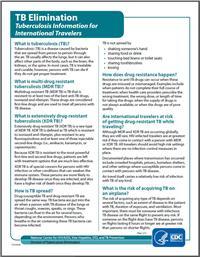
This information sheet discusses TB and the risk for international travelers. It explains TB transmission, multidrug-resistant (MDR) and extensively drug-resistant (XDR) strains of the disease, and how drug resistance occurs. The information sheet considers whether international travelers are at risk of MDR or XDR TB while traveling, the risk of acquiring TB on an airplane, how TB can be prevented, TB vaccine, and what an individual should do before traveling internationally and if an individual thinks that he/she may have been exposed to someone with TB disease. It lists the symptoms of TB disease and where to find other health information about a travel destination. Contact information is provided for additional resources.
A .gov website belongs to an official government organization in the United States.
A lock ( ) or https:// means you've safely connected to the .gov website. Share sensitive information only on official, secure websites.
- Signs and Symptoms
- Causes and Spread
- Testing for Tuberculosis
- Risk Factors
- Clinical Overview
- Clinical Signs and Symptoms
- Clinical Testing and Diagnosis
- Mantoux Tuberculin Skin Test Toolkit
- Health Care Provider Communication and Education Resources
- ICD-10-CM Codes for TB
- Tuberculosis Case Reporting
- Guidance for Public Health Professionals
- Laboratory Information
- False-Positive Investigation Toolkit
- Tuberculosis Genotyping
- Dear Colleague Letters
- MDDR Request Form
- TB Programs
Related Topics:
- Show All Home
- TB Prevention in Healthcare Settings
- Information for Tuberculosis Programs
Tuberculosis: Causes and How It Spreads
- Tuberculosis (TB) germs spread through the air from one person to another.
- TB germs can get into the air when someone with active TB disease coughs, speaks, or sings.
- People nearby may breathe in these germs and become infected.
- People with inactive TB, also called latent TB infection, cannot spread TB germs to others.
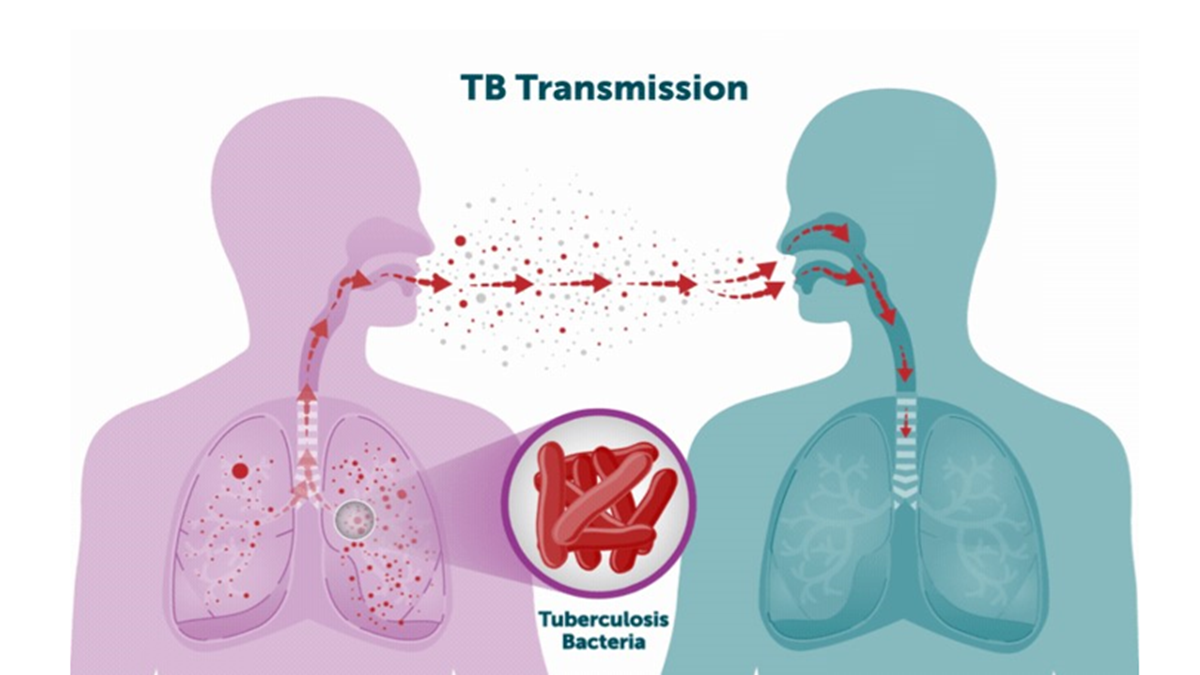
Tuberculosis (TB) is caused by a bacterium (or germ) called Mycobacterium tuberculosis . When a person breathes in TB germs, the germs can settle in the lungs and begin to grow. From there, they can move through the blood to other parts of the body, such as the kidney, spine, and brain.
TB bacteria can live in the body without making you sick. This is called inactive TB , or latent TB infection . People with inactive TB are infected with TB germs, but they do not have active TB disease . They do not feel sick, do not have symptoms of TB disease, and cannot spread TB germs to others.
Without treatment , people with inactive TB can develop active TB disease at any time and become sick.
TB germs become active if the immune system can't stop them from multiplying and growing in the body. When TB germs are active (multiplying in your body), this is called active TB disease . People with active TB disease feel sick. They may also be able to spread the germs to people they spend time with every day. Without treatment , active TB disease can be fatal.
How it spreads
TB germs can get into the air when a person with active TB disease of the lungs or throat coughs, speaks, or sings. These germs can stay in the air for several hours, depending on the environment.
TB germs are more likely to spread in indoor areas or other places with poor air circulation (such as a closed vehicle) than in outdoor areas. People nearby may breathe in these germs and become infected.
TB germs are not spread by:
- Shaking someone's hand
- Sharing food or drink
- Touching bed linens or toilet seats
- Sharing toothbrushes
Prevention methods
If you have inactive tb, treating it is the best way to prevent active tb disease..
Without treatment, people with inactive TB can develop active TB disease.
People with weakened immune systems are at very high risk of developing active TB disease once infected with TB germs. It is very important that these people receive treatment for inactive TB to prevent the development of active TB disease.
If you have active TB disease of the lungs or throat, you may need to take steps to prevent spreading TB germs to other people.
If you have TB disease of the lungs or throat, you could be infectious. This means you could spread TB germs to others.
Your health care provider will tell you what steps you can take to keep from spreading TB germs to others. This may include things like covering your mouth with a tissue when you cough or staying home from work or school. After taking your medicine for a few weeks, you will feel better and you may no longer be infectious to others.

When transmission is possible
Active TB disease in the lungs or throat can be infectious. This means the germs can spread to other people. TB disease in other parts of the body, such as the kidney or spine, is usually not infectious.
People with active TB disease are most likely to spread it to people they spend time with every day. This includes family members, friends, and coworkers or schoolmates.
Do you think you may have been exposed to TB?
Risk factors.
You may have been exposed to TB germs if you spent time near someone with active TB disease.
You have a higher risk of being exposed to TB germs if you:
- Were born in or frequently travel to countries where TB is common , including some countries in Asia, Africa, and Latin America
- Live or used to live in large group settings where TB is more common, such as homeless shelters , prisons , or jails
- Recently spent time with someone who has active TB disease
- Work in places where TB is more likely to spread
You have a higher risk of developing active TB disease once infected if you:
- Were recently infected with TB germs
- Have a weaker immune system because of certain medications or health conditions such as diabetes , cancer, or HIV
Some people develop active TB disease soon (within weeks) after becoming infected, before their immune system can fight the TB germs. Other people may get sick years later, when their immune system becomes weak for another reason.
- Questions and Answers About Tuberculosis
- Tuberculosis General Information Fact Shee t
- Think. Test. Treat TB Campaign
Tuberculosis (TB)
Tuberculosis is caused by bacteria called Mycobacterium tuberculosis . The bacteria usually attack the lungs but can attack any part of the body.
For Everyone
Health care providers, public health.
You are using an outdated browser. Upgrade your browser today or install Google Chrome Frame to better experience this site.
Tuberculosis (TB)
What is tuberculosis, who is at risk, what can travelers do to prevent tuberculosis, after travel, more information.
Tuberculosis (TB) is a disease caused by bacteria called Mycobacterium tuberculosis . People with TB can spread it in the air to others when they cough, speak, or sing. You can get sick when you breathe TB bacteria into your lungs. TB bacteria in the lungs can move through the blood to infect other parts of the body, such as the kidney, spine, and brain.
Symptoms of TB disease in the lungs include
- Cough that lasts 3 weeks or longer
- Pain in the chest
- Coughing up blood or mucus
- Weakness or fatigue
- Weight loss
- Loss of appetite
- Sweating at night
Symptoms of TB infection in other parts of the body depend on the area affected.
Not everyone infected with TB bacteria becomes sick or has symptoms. This is called latent TB infection . People with latent TB infection cannot spread TB to others. However, a person with latent TB infection can get sick years later if their immune system becomes weak. People with latent TB infection can take medicine to prevent developing TB Disease.

Where are you going?
TB occurs throughout the world but is much more common in some countries. Most TB occurs in sub-Saharan Africa, Eastern Europe, and Asia. Some TB bacteria are resistant to the drugs used to treat infection ( drug-resistant TB ). Fortunately, drug-resistant TB is rare.
Travelers planning to work in health care settings should consult infection control or occupational health experts in the country before seeing patients.
People with weak immune systems, especially those with HIV infection, are much more likely to develop TB disease compared to people with healthy immune systems.
A traveler’s chances of getting TB on a plane are very low.
Travelers can protect themselves by taking the following steps
- Avoid being close to or around a person who could have TB for long periods of time . This is especially important for travelers spending time in crowded environments, like clinics, hospitals, prisons, or homeless shelters.
- Avoid close contact with people who are coughing and who look sick .
- Take special precautions around people known to have TB. Travelers spending time working in health care settings should talk to an infection control or occupational health expert about what steps they can take to prevent TB infection, such as wearing an N95 respirator. They should also talk to a doctor about being tested for TB infection before leaving the United States. If the test reaction is negative, have a repeat TB test 8 to 10 weeks after returning to the United States
A TB vaccine exists, but CDC does not recommend it for travelers.

If you traveled and feel sick, particularly if you have a fever, talk to a healthcare provider and tell them about any areas you recently traveled to.
If you need medical care abroad, see Getting Health Care During Travel .
- Tuberculosis Information for International Travelers
- Basic TB Facts
- CDC Yellow Book: Tuberculosis
File Formats Help:
- Adobe PDF file
- Microsoft PowerPoint file
- Microsoft Word file
- Microsoft Excel file
- Audio/Video file
- Apple Quicktime file
- RealPlayer file
- Zip Archive file
Exit Notification / Disclaimer Policy
- The Centers for Disease Control and Prevention (CDC) cannot attest to the accuracy of a non-federal website.
- Linking to a non-federal website does not constitute an endorsement by CDC or any of its employees of the sponsors or the information and products presented on the website.
- You will be subject to the destination website's privacy policy when you follow the link.
- CDC is not responsible for Section 508 compliance (accessibility) on other federal or private website.
An official website of the United States government
The .gov means it's official. Federal government websites often end in .gov or .mil. Before sharing sensitive information, make sure you're on a federal government site.
The site is secure. The https:// ensures that you are connecting to the official website and that any information you provide is encrypted and transmitted securely.
- Publications
- Account settings
- Browse Titles
NCBI Bookshelf. A service of the National Library of Medicine, National Institutes of Health.
Tuberculosis and Air Travel: Guidelines for Prevention and Control. 3rd edition. Geneva: World Health Organization; 2008.
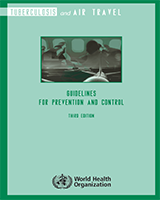
Tuberculosis and Air Travel: Guidelines for Prevention and Control. 3rd edition.
6 contact investigation following potential exposure to m. tuberculosis, 6.1. criteria for deciding whether to initiate a contact investigation.
The treating physician should undertake a clinical evaluation in all cases of severe communicable disease of public health concern, including a detailed history of recent travel (i.e. within three months) including travel by air, destination(s) and duration of travel.
Physicians should immediately inform the public health authority after assessing a recent (i.e. within three months) history of air travel in a patient with confirmed pulmonary or laryngeal TB, in addition to submitting the required notification for a TB case.
Following receipt of the physician’s report, the public health authority should conduct a risk assessment to determine whether a contact investigation is needed. The public health authority should evaluate the risk of M. tuberculosis transmission and decide whether it is necessary to inform travellers who may have been in close contact with the index case of the potential exposure. For this purpose, the following risk assessment criteria should be used:
sputum-smear examination;
presence of cavitations on chest X-ray;
documented transmission to close contacts;
presence of symptoms (e.g. cough, haemoptysis) at the time of the flight;
- duration of exposure;
identification of susceptible individuals as potential contacts;
proximity of other travellers to the index patient;
consequences of transmission (MDR-TB and XDR-TB);
- time elapsed between the flight(s) and the notification of the case.
Fig. 2 summarizes the steps to be followed by public health authorities in determining whether travellers should be informed of their possible exposure to infectious TB on commercial flights.
Assessing whether contact-tracing is needed.
In both infectious and potentially infectious cases as defined in section 5.1 , the national public health authority in the country where the case was reported should inform counterpart authorities of the other countries involved (at least the countries where the flight departed and landed) if the flight duration was 8 hours or longer. This should be done whether or not any further action is required by national regulations in the country where the case was reported.
6.1.1. Infectiousness of the index case
Determination of infectiousness . Tracing travellers and informing them of potential exposure to M. tuberculosis is recommended only if the person with TB is likely to have been infectious or potentially infectious at the time of the flight(s). The infectiousness of the index case is to be assessed by the relevant public health authority. A person should be considered infectious at the time of the flight(s) when he or she meets the conditions identified in chapter 5 . Priority should be given to conducting contact investigations for index cases that meet the criteria for being infectious. Consideration may also be given to conducting contact investigations for index cases that meet the criteria for being potentially infectious based on: (1) national contact investigation policies; and (2) assessment of the likelihood of transmission using the criteria listed in section 6.1 .
6.1.2. Duration of exposure
Informing close contacts is indicated if the total flight duration was 8 hours or longer.
If a public health authority concludes that the index case was infectious or potentially infectious (as defined in section 5.1 ) at the time of travel, contact should be made promptly with the airline medical service (or designated official) in order to confirm that the person with TB was on the flight(s) in question and to determine the total duration of each flight.
The duration of exposure is estimated on the basis of the total duration of the flight, including ground delays after boarding, flight time and ground delays after landing. The public health authority should construct a complete history of the flight(s) including the approximate duration of all ground delays. Evidence for M. tuberculosis transmission has been found only when the duration of exposure was 8 hours or longer ( 6 , 10 ). Therefore, only those travellers in close contact with and exposed to the index case for at least 8 hours should be informed. If the TB patient travelled on more than one airline, the public health authority should contact each airline on which the passenger travelled on a flight of 8 hours or longer total flight duration.
If the total flight duration (including all ground delays) was 8 hours or longer, the public health authority should send an official letter to the airline company requesting passenger contact information. A sample letter is provided in Annex 2 .
6.1.3. Time elapsed between the flight(s) and the notification of the case
Contact investigation should usually be limited to flights that took place during the three months before notification of the tb case to the public health authority.
There may be substantial delays between diagnosis of TB, recognition that the person with infectious TB had travelled on commercial flight(s) and notification to the public health authority. The reliability of the contact information will be related to the time interval between the flight and the diagnosis of TB.
Given the difficulties of (i) assessing infectiousness at the time of the flight, (ii) interpreting TST results to determine recent versus remote infection, and (iii) obtaining sufficiently accurate passenger travel and seating details, three months is considered the maximum time after travel that would usually warrant public health intervention, including contacting the airlines and subsequent contact-tracing. Public health investigations of incidents reported more than three months after the time of travel require, in addition to the risk assessment, a prior assessment of the availability of contact information.
6.1.4. Proximity of other passengers and crew to the index case
Passenger-to-passenger transmission of m. tuberculosis has been documented only among close contacts seated in the same section as the index case.
Informing those passengers seated in the same row as the index case and those seated in the two rows (from one side of the aircraft to the other because of ventilation patterns) in front of and behind is usually sufficient. Informing passengers seated in rows which are separated by a solid bulk-head from the row where the index case was seated is not indicated.
To date, there have been no known cases of cabin crew having been infected by a passenger with infectious TB during an airline flight. Furthermore, due to the usual nature and limited duration of contact between cabin crew and individual passengers, crew members would not normally be considered close contacts of an index case. However, in special circumstances, such as a cabin-crew member designated to look after an ill passenger who is subsequently found to have infectious or potentially infectious TB, public health authorities may consider the cabin-crew member(s) to be close contacts.
If the infectious source is one of the cabin crew, passengers are not considered to be close contacts, due to the usual nature and limited duration of contact between cabin crew and passengers. Passengers are also not considered to be close contacts if the index case is a member of the flight-deck personnel (e.g. pilot, co-pilot, flight engineer, training officer) because there is usually no contact between passengers and flight-deck personnel. However, in such cases the contact-tracing risk assessment should include all work colleagues who were potentially exposed, including in-flight, during layovers and in ground roles.
6.2. Recommended roles and responsibilities when exposure to infection is suspected
- The first public health authority to receive a report on an incident involving possible exposure to infectious or potentially infectious TB during air travel (usually, but not always, in the country where the index case was diagnosed), should inform counterpart public health authorities in all countries where the flight(s) departed and landed, in accordance with these guidelines.
- The public health authorities in the latter countries should then inform the public health authorities of the countries of residence of the identified contacts, in accordance with these guidelines.
- In the countries of residence of the contacts, the public health authorities should follow national policy for TB contact investigation.
Public health authorities and airline companies should collaborate to assess whether exposure may have occurred
Public health authorities and the airline medical service (or designated official) should work together to determine whether an exposure to infectious or potentially infectious TB could have occurred (according to the case definitions in section 5.1 ) and, if so, which travellers should be informed. Airlines should collaborate closely with public health authorities in providing as quickly as possible all available information requested for contact-tracing. All possible close contacts should receive appropriate information promptly from the public health authority. (Alternatively, other established local arrangements for informing contacts may be followed.)
The first public health authority to be informed of the index case is that of the country where the diagnosis was made
The public health authority of the country where the diagnosis was made (usually the destination country) should carry out the risk assessment based on the specific conditions of the index case (see section 6.1 ) and, if required, initiate the investigation process.
The national (or local, if appropriate) public health authority of the country which initiates the process should inform the public health authorities of all countries involved (i.e. countries where the flight/flights have departed and landed), to agree on their respective roles and responsibilities, which include: (i) obtaining details of the index case; (ii) informing other involved countries; and (iii) the request to the airline(s) for the passenger manifest. Personally-identifiable health information may be subject to requirements that it be held confidential or used strictly for public health purposes in accordance with national or international law (including the IHR). In addition, in some circumstances, such cases may have to be reported to WHO under the IHR (see Annex 1 ).
Effective communication links between national public health authorities are necessary to ensure an efficient coordinated response. In complex situations, for instance involving several countries, international bodies such as WHO, EC, ECDC or others may be requested to facilitate the process if deemed necessary. The updated list of national IHR focal points, and their contact information, is available to all national public health authorities.
The public health authority of the country that obtained the passenger list(s) should inform the counterpart health authorities in all countries where close contacts are resident through the existing procedures of communication. The relevant information for these contacts should be provided (contact details, nature of the exposure and flight details, clinical information to determine infectiousness or potential infectiousness of the index case, and drug-resistance pattern if available).
Public health authorities are usually informed by a physician about a traveller in whom TB has been diagnosed before the airline has been informed. In instances where the airline is informed first, the airline should obtain basic contact details of the informant (patient, physician or other) to be passed on to the appropriate public health authority and advise the informant that the treating physician should communicate all information immediately to the public health authority. Before any further action is considered in such cases, public health authorities should confirm whether the person has pulmonary or laryngeal TB and carry out an assessment of the risk of infection to other travellers on the flight(s) concerned.
6.3. Informing close contacts
Public health authorities are responsible for identifying and informing close contacts of their potential exposure to m. tuberculosis.
Airline companies should cooperate with the relevant public health authorities to promptly supply all available information needed to contact passengers who are likely to have been exposed, so that the public health authorities can provide the contacts with appropriate information and guidance. (See related IHR requirements, Annex 1 .)
For cabin crew considered to be close contacts (see section 6.2.4), an airline medical department may, with the agreement of the public health authority and in accordance with relevant laws, take responsibility for contacting and informing crew member(s) deemed to be at risk. It should be clearly established, by the public health authority and the airline, who will notify the potentially exposed crew. If the airline company prefers to notify its crew through established procedures, the airline should ensure that the crew member(s) receives and understands the relevant information for appropriate risk assessment including date and duration of the flight, and clinical details of the case related to infectiousness (smear status, culture status, symptoms and resistance pattern).
In exceptional instances, if public health authorities decide to issue a press release or communicate publicly through other media for the purpose of contact-tracing, the counterpart authorities in all other involved countries should be informed at the time of, or prior to, the public release of the information. This may also be required by WHO in accordance with the IHR, if any required reporting has not already been ongoing.
6.4. Practical issues for contact investigation after potential exposure to M. tuberculosis
Adequate and timely contact investigation after potential exposure to m. tuberculosis may be impeded by practical constraints.
Constraints particularly involve the length of time between travel, diagnosis and reporting, and the accuracy and availability of airline records. Published studies have highlighted the practical difficulties and substantial resources involved in conducting contact investigations in such cases ( 12 , 13 ).
Investigations of possible M. tuberculosis transmission on board commercial aircraft are usually initiated several weeks to months after the flight. Passengers are therefore often difficult to locate. Airlines are not required to retain passenger records after the flight and, with the exception of passengers enrolled in “frequent flyer” programmes, airline companies do not maintain records of passengers’ addresses, telephone numbers or emergency contact information. Although a telephone number is often requested by the airline at the time of booking, this is not a requirement and the accuracy of the information provided is not known. Passenger contact information maintained in airline records is inadequate for contact- tracing purposes in a high proportion of cases.
Immigration (landing) cards are completed by passengers and crew arriving in some countries and residence addresses are required. Depending on the country, one form may be completed for passengers from the same household rather than separate forms for each individual passenger. In addition, because forms are handwritten, it is often not possible to read the passenger’s name and the address information is frequently incomplete, inaccurate or missing. Thus, the usefulness of these forms for follow-up purposes may be limited, and often contact identification cannot be accomplished. However, regardless of the limitations, immigration landing cards may be used as a source of information to support contact-tracing.
In some instances, country of citizenship and passport number are the only contact passenger information available from the airline. Some countries have established internal arrangements for obtaining contact information for passengers from their passport numbers. Any available information on affected passengers should therefore be sent to the appropriate public health authority for follow-up of contacts.
Efforts are under way nationally and internationally to improve the collection of passenger contact information for use in contact investigations. As an interim measure, locator cards have been developed by IATA for consideration by public health authorities; these cards contain the name, seat number and emergency contact information of selected passengers on board in the event that someone on the same flight with a suspected communicable disease is subsequently diagnosed with infectious TB or another communicable disease of public health significance.
Ultimately, the timely notification of passengers and crew relies on efficient and accurate communication between national public health authorities, airline companies and other public agencies.
The list of national IHR focal points is available to States; the list of competent authorities for contact investigations should be available and updated at the national level.
6.5. Procedures for follow-up of contacts
National guidelines for TB contact investigation should be followed in countries where they are available. Contact investigations may not be part of national policy (e.g. in high-burden countries with limited resources) and the decision to initiate a contact investigation should be considered in the context of the national policies or guidelines.
For countries without guidelines for TB contact investigations, the steps outlined in Annex 3 may be considered.
All rights reserved. Publications of the World Health Organization can be obtained from WHO Press, World Health Organization, 20 Avenue Appia, 1211 Geneva 27, Switzerland (tel.: +41 22 791 3264; fax: +41 22 791 4857; e-mail: tni.ohw@sredrokoob ). Requests for permission to reproduce or translate WHO publications – whether for sale or for noncommercial distribution – should be addressed to WHO Press, at the above address (fax: +41 22 791 4806; e-mail: tni.ohw@snoissimrep ).
- Cite this Page Tuberculosis and Air Travel: Guidelines for Prevention and Control. 3rd edition. Geneva: World Health Organization; 2008. 6, Contact investigation following potential exposure to M. tuberculosis.
- PDF version of this title (465K)
In this Page
- Criteria for deciding whether to initiate a contact investigation
- Recommended roles and responsibilities when exposure to infection is suspected
- Informing close contacts
- Practical issues for contact investigation after potential exposure to M. tuberculosis
- Procedures for follow-up of contacts
Other titles in this collection
- WHO Guidelines Approved by the Guidelines Review Committee
Recent Activity
- Contact investigation following potential exposure to M. tuberculosis - Tubercul... Contact investigation following potential exposure to M. tuberculosis - Tuberculosis and Air Travel
Your browsing activity is empty.
Activity recording is turned off.
Turn recording back on
Connect with NLM
National Library of Medicine 8600 Rockville Pike Bethesda, MD 20894
Web Policies FOIA HHS Vulnerability Disclosure
Help Accessibility Careers
This website uses cookies to ensure you get the best experience on our website. Learn more

Information on how to stay safe and healthy abroad. About us.
- Disease Prevention Advice
Tuberculosis
Introduction.
- Recommendations
Vaccination
Overview of disease, the illness, further information.
Tuberculosis (TB) is spread through sneezing, coughing or direct, close contact with respiratory secretions from an infected individual. TB can affect any part of the body.
Recommendations for Travellers
If you have concerns regarding potential exposure to tuberculosis during travel please speak to your travel health practitioner for more information.
The vaccine that protects against TB is called the 'BCG' vaccine. In the United Kingdom, routine BCG vaccination for teenagers was discontinued in 2005.
BCG may be required for those who have not previously been vaccinated , according to the destination and the nature of travel. The vaccine is recommended for those under 16 years of age who are going to live and work with local people for more than three months in an area where the incidence of tuberculosis is high.
Tuberculosis is a bacterial infection due to Mycobacterium tuberculosis . It is spread through respiratory contact (coughs, sneezes from an infected individual) but the disease can affect any part of the body
Tuberculosis is found throughout the world. Areas of particular risk include Africa and Asia. 64% of cases globally are found in 7 countries: India, Indonesia, China, Phillipines, Nigeria, Pakistan and South Africa.
Tuberculosis symptoms are varied and can depend upon the part of the body that has been infected. General symptoms include fever, loss of appetite, weight loss, night sweats and tiredness.
Respiratory tuberculosis can cause persistent, productive cough and may be accompanied by blood-streaked sputum.
The disease is treatable if diagnosed and treatment is completed. The illness is more severe in children, those with other underlying illness (particularly HIV) and in smokers. Over 95% of deaths from TB occur in developing countries.
Treatment for tuberculosis is with a combination of antibiotics over a minimum of 6 months.
- World Health Organization TB Factsheet
back to top
- General Travel Health Advice
Ideal timing for travel insurance purchase
Advantages of purchasing travel insurance early.
- When to buy annual travel insurance
When is it too late to buy travel insurance?
- Frequently asked questions
When to Buy Travel Insurance: Timing Your Purchase Perfectly
Affiliate links for the products on this page are from partners that compensate us (see our advertiser disclosure with our list of partners for more details). However, our opinions are our own. See how we rate insurance products to write unbiased product reviews.
- Purchase travel insurance when traveling internationally or on long and expensive trips.
- Buying travel insurance right after booking your trip is best, as some coverage options are time-sensitive.
- Cancel For Any Reason policies and coverage for pre-existing coverage require early purchase.
Travel insurance protects you against financial losses and medical emergencies while on a trip. You'll want to book travel insurance when going on long, expensive, or international trips. However, the exact timing of your purchase is also important.
Generally, you'll want to buy travel insurance soon after you book your trip to get the maximum coverage out of your policy. Here's what you need to know about travel insurance and when you should buy it.
Though you can insure your trip anytime after booking, the best time to purchase travel insurance is immediately after booking your trip.
For one, unexpected circumstances may arise between when you book your trip and when you leave. If an injury or inclement weather cancels your trip before you have a chance to purchase travel insurance, you may not get a refund. Purchasing travel insurance early reduces the chances of that happening.
Michelle Osborn, owner of boutique travel agency Outta Here Travels , says, "Most travel insurance policies have a time limit of when you can purchase to get the maximum benefits."
It's important to note that you do not have to have every detail of your trip planned before purchasing travel insurance. Most policies are flexible, so you can add details and update your costs in the days leading up to the trip. Don't let some unplanned details in your trip prevent you from purchasing travel insurance.
When you purchase travel quickly after booking, you'll have additional coverage options.
- Purchase cancel for any reason coverage , which reimburses you for 60% to 75% of your costs if you back out on your travel plans for a reason not usually covered. CFAR policies must be purchased within 15 to 21 days of putting down the first deposit on your trip. You can find our picks for the best CFAR travel insurance here.
- Guarantee coverage for pre-existing conditions. Many travel insurers won't cover pre-existing conditions unless you purchase coverage within two weeks of booking your trip.
- Cancel your travel insurance if you're not happy with it. Most plans allow you to cancel your insurance and get a refund — as long as you do so within 15 days and your trip hasn't started.
If you cannot purchase your travel insurance right after booking, you should still qualify for a policy if your trip hasn't been canceled. Most companies allow you to buy insurance until the day of your trip. You just won't have access to CFAR or pre-existing condition coverage.
When to buy annual travel insurance
Annual travel insurance , sometimes referred to as multi-trip insurance, covers you for all your trips over a 12-month period. This type of travel insurance may be a good option if you regularly travel for work or have a handful of trips, particularly international trips, planned for the next 12 months.
"Travel insurance should definitely be purchased anytime you travel out of the United States," Osbon says. "The main reason is most US health insurance policies don't cover treatment internationally."
You may want to buy annual travel insurance just before your first trip begins. Since these plans last 365 days, you can stretch your policy to cover the most travel. However, this may limit your coverage, so tread carefully. For example, you may not be able to get medical coverage for pre-existing conditions.
"In the case of a pre-existing medical condition, you'll need to meet a few requirements to be covered," says Jeff Rolander, director of claims at Faye Travel Insurance . "Faye's travel protection covers pre-existing conditions as long as you purchase your plan within 14 days of your initial trip deposit and are medically able to travel when you purchase your plan."
You should be able to purchase travel insurance any time before the date of your trip. Once the day of your departure rolls around, the window will close. You also can't purchase travel insurance during your trip or after an injury or loss has already happened.
The moral of the story: It's always better to buy sooner rather than later.
"Right when you book your flights or hotel stay is when you should get your trip covered," Rolander says. "The sooner you buy coverage for your trip, the sooner your coverage starts."
When to buy travel insurance frequently asked questions
You should purchase travel insurance within two weeks of booking your trip to receive maximum benefits, especially pre-trip cancellation coverage.
While you can purchase travel insurance up until the day of departure, doing so may limit certain benefits. Additionally, last-minute travel insurance won't cover pre-existing health conditions.
Lengthier and more expensive trips generally call for travel insurance because you have more to lose. Purchasing travel insurance earlier mitigates the potential damage of a cancellation.
Most travel insurance policies allow for modifications or additions within a specific period after purchase, but it's important to check the policy terms.
Purchasing travel insurance early is generally beneficial for comprehensive coverage, but you may see your premiums rise if you make significant changes to your travel plans.
- Real estate
- Main content

Business Insider
I tried to spend as little as possible on Carnival's newest cruise ship. I recommend shelling out for better food and more fun.
Posted: June 27, 2024 | Last updated: June 27, 2024
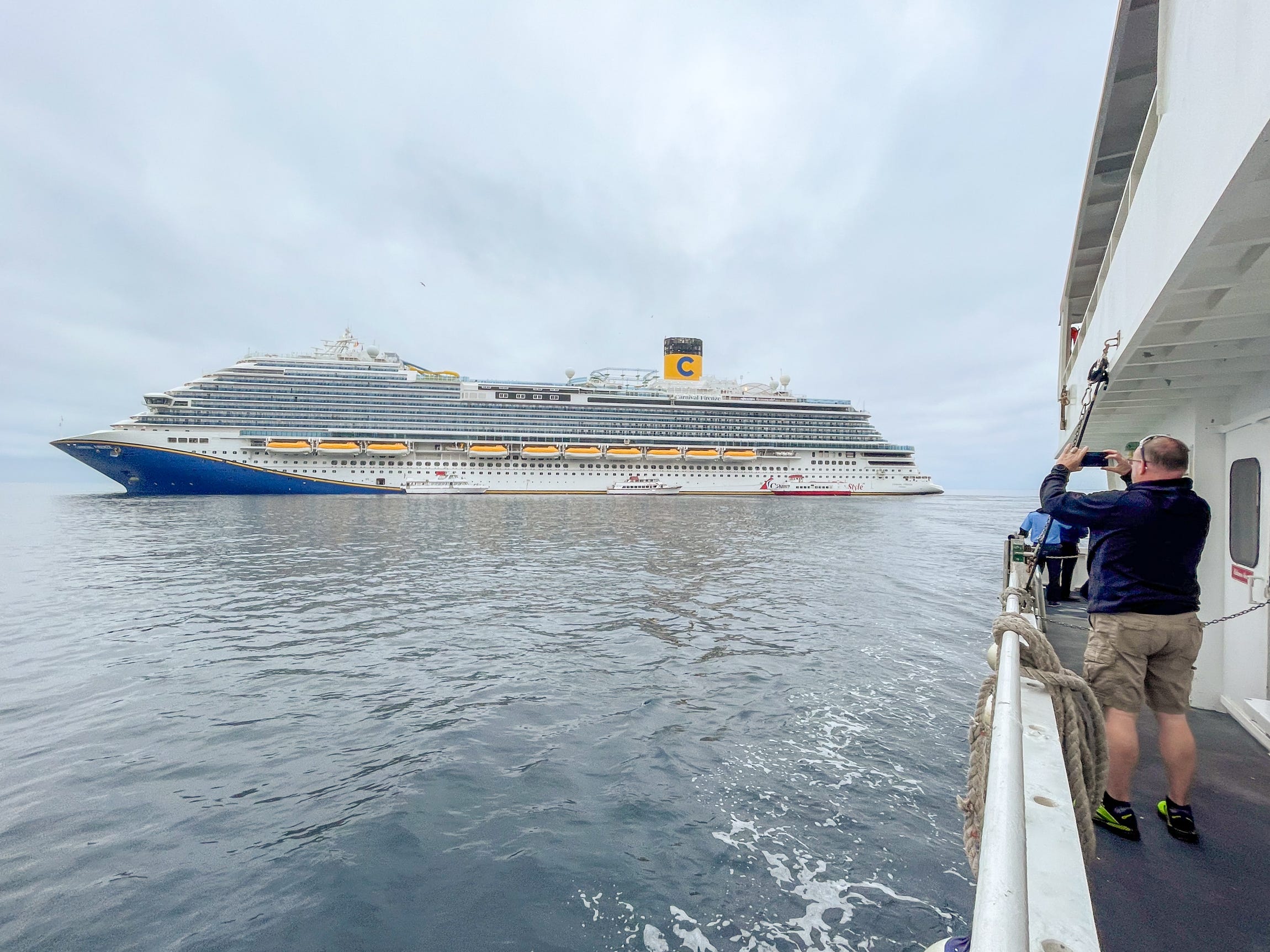
- I turned down almost all upcharged amenities during my four-day Carnival Firenze cruise .
- The new ship has more complimentary family-friendly activities than some of its competitor's latest vessels.
- But snubbing the up-charged food made for a less-than-amazing cruise.
Looking for a vacation that lets you ball on a budget? You'll certainly hit your "budget" requirement on Carnival's new Firenze ship — so long as you don't expect to truly ball out.
Cruises are an economical vacation option . After all, what other ticket includes unlimited food, a hotel room, activities, and the opportunity to see several destinations in one trip — all for less than $80 a day like Carnival is offering in 2024?
But if you're unwilling to spend more than the base fare, you could have a pretty different vacation experience from your peers who are ready to pay-to-play. At least, that's how I felt during my first Carnival cruise in mid-May on the new Firenze.

My stubborn stance against upcharged services resulted in a less-than-amazing experience.
Josh Weinstein, president and CEO of Carnival Corp, the cruise line's parent company, told investors in late June that the company wants to continue to be known as a "cost leader" in the industry.
Its new ship is a great example of this. Carnival says it's seeing strong demand from its US market. But instead of building a new vessel, the company acquired Firenze and its sister ship from Costa Cruises, another Carnival Corp brand, in 2022.

Besides WiFi, I refused to front for Firenze's up-charged activities and services.
I went on Carnival Firenze for work, which meant I had to cave on the ship's premium WiFi at $85 for all four nights.
Internet connectivity, specialty dining, and drinks packages are always extra on mass market ships . But over the last few years, cruise giants have added more irresistible pay-to-play amenities to their vessels, all while still luring travelers in with affordable base fares.
On Norwegian's newer ships , for example, this means paying $10 for a round of mini-golf or $29 for an hour at the VR arcade.
Not bad compared to Royal Caribbean's new Icon of the Seas , where travelers have to pay $200 for the fanciest restaurant or $49 for a ropes course that could be completed in less than a minute.
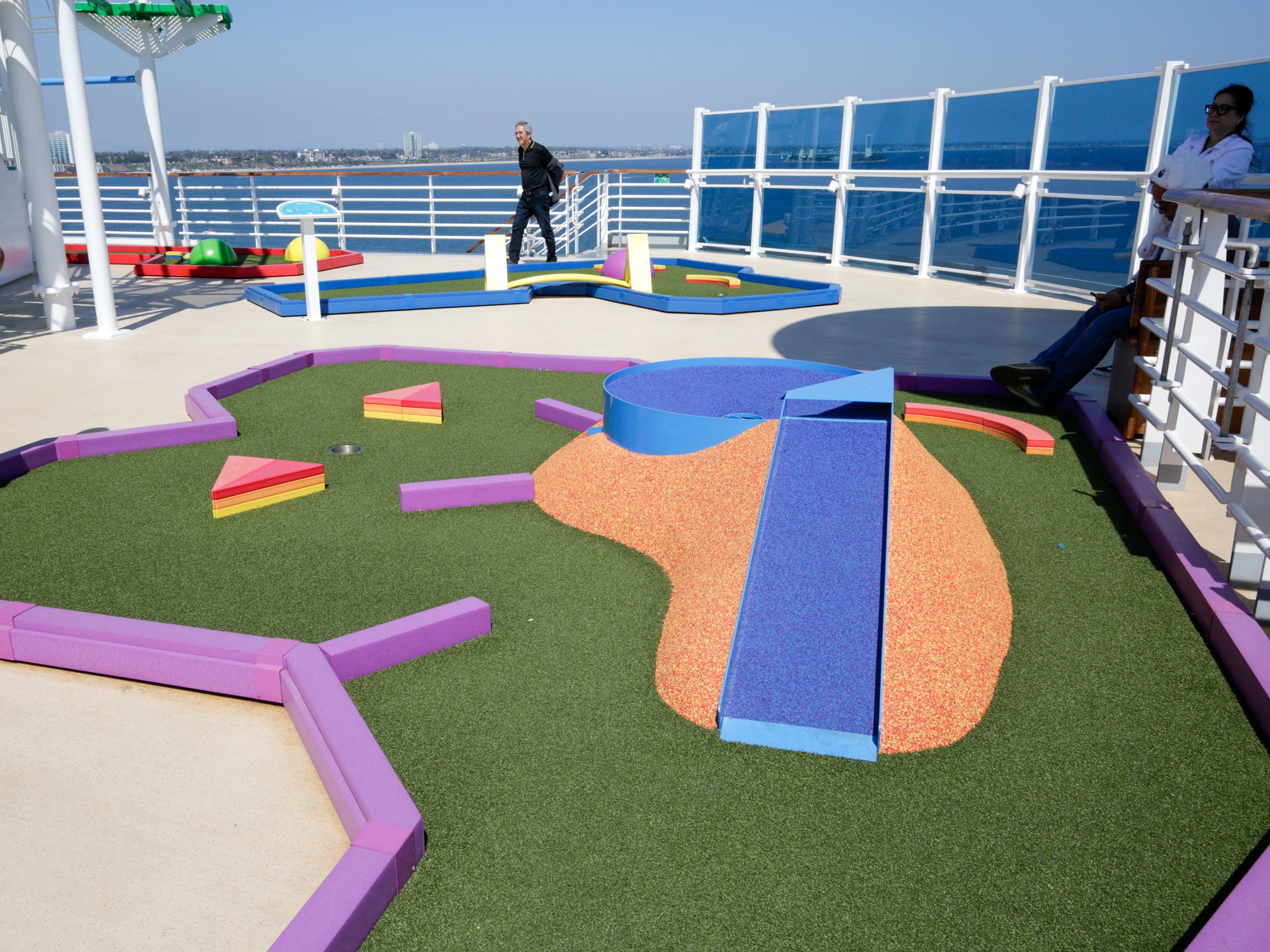
To Carnival’s credit, Frienze had more complimentary family-friendly amenities than some of its competitors’ newer ships.
The mini-golf course wasn't nearly as flashy as Norwegian's. But mini-golf is mini-golf, no matter the number of bright lights and animated courses.
The same was true for Firenze's ropes course. While it didn't have the same thrilling floor drop as Icon of the Seas', the multi-part walkway was longer, more diverse, and, more importantly, free.
I much preferred it to the one on Icon.

Families could spend their afternoons shooting hoops, going on the waterslides, and competing over board games — all without spending a cent.
The arcade was one of the few activities that wasn't free. Then again, they rarely are.
But don't book Firenze if you're seeking a quiet, relaxing ship. I struggled to find a peaceful public space where I could churn out some work without being distracted by the loud music and guests.
The only truly quiet space could've been the spa. But again, I wasn't going to pay for a massage.
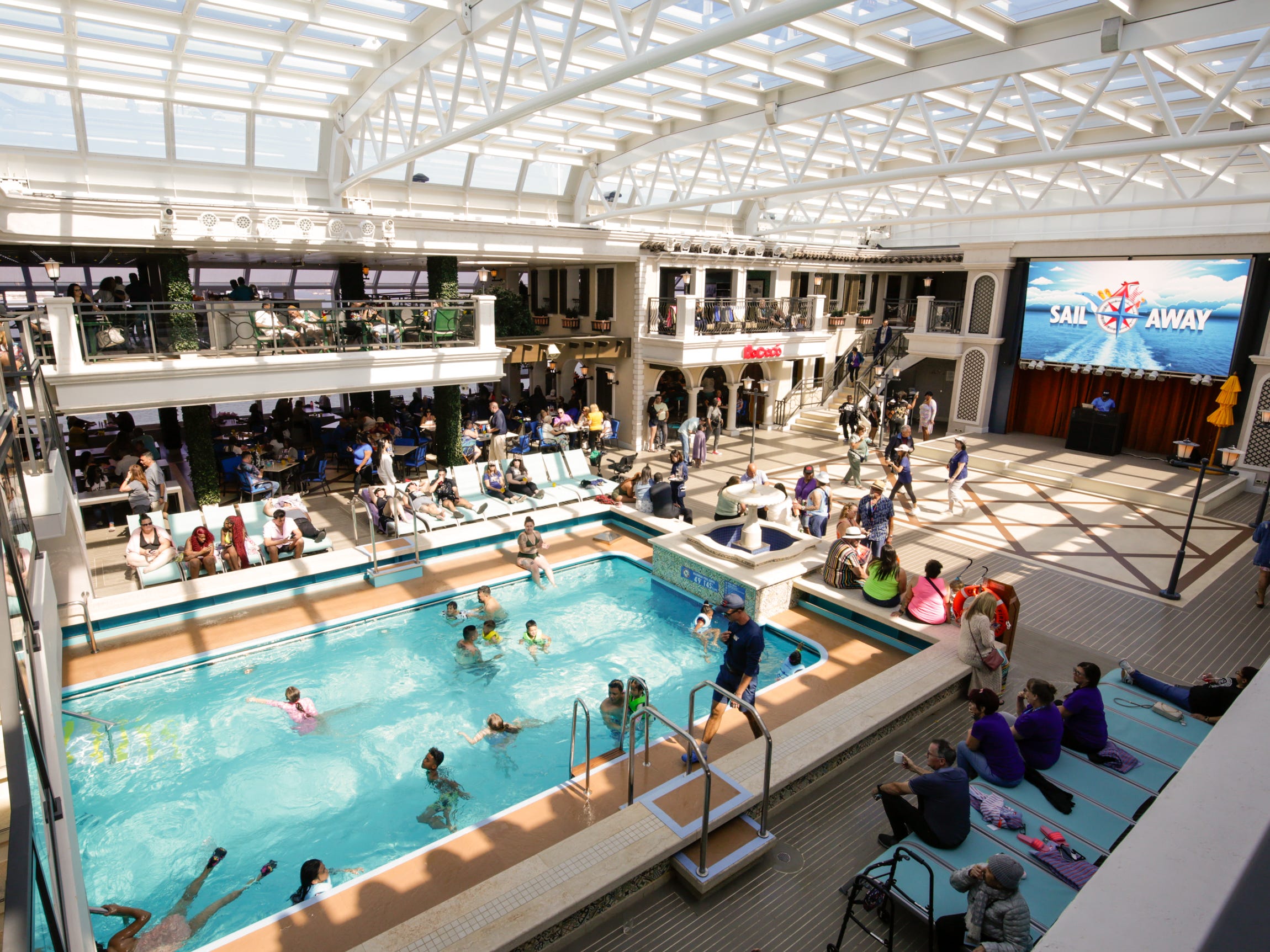
In the eveing, I passed the time by catching the nightly movies and attending the theater's shows.
Just know that the latter isn't a must-do. Some singers in the cheesy song-and-dance production "Dear Future Husband" were painfully off-key.
And if you want to munch on a bag of popcorn during the movie, you'll have to pay $4. Smelling the buttery snack without having one in my hands was a torturous tease.

Several of Firenze’s bars — like Piano Bar 88 — featured live musicians, too.
Moda Bar and Lounge also had singers, if you count karaoke night.
But if you want a drink to accompany the entertainment, you'll have to spend about $13 for cocktails and $9 for beers and seltzers.
So, late-night foosball it was — for four nights in a row. At least it was free.

Activities like live music and board games are almost always free on cruise ships.
But that doesn't exempt Carnival Firenze from the industry-wide push for more pay-to-play amenities . There's a reason the company saw a spike in onboard spending in the second quarter of 2024 compared to the same time last year — despite rising ticket prices.
I doubt it's solely because of increased participation at Firenze's live "Deal or No Deal" game show, which starts at $25 to play. Or the $4 shuttle from the port at Ensenada, Mexico on day three to downtown (which I regret not paying for).

In retrospect, I wish I had fallen for Firenze's upcharged foods.
Norwegian and Royal Caribbean's newer ships had complimentary dining that was as good as, if not better, than the premium options. I still crave Norwegian Prima's free food hall .
I can't say the same for my no-fee dining experience on Firenze.

The ship had six specialty restaurants ranging from teppanyaki to steaks.
The cruiseliner has a kitschy Italian theme, as its name might suggest. But if I had wanted to continue the Italian tune with some shrimp scampi and burrata at the Il Viaggio restaurant, I would've had to drop more than $40.
So, instead, I had my nightly meals in the mediocre main dining room, which served the same dinner dishes as the buffet.
None of my Carnival Firenze dinners were stellar, and finding a piece of plastic in my pasta didn't help, either.

I always have juice with my breakfast at home.
But continuing my ritual on Firenze would've meant coughing up $5 per glass. It was tempting, especially as the main dining room server stopped by every table with a tray of the colorful concoctions.
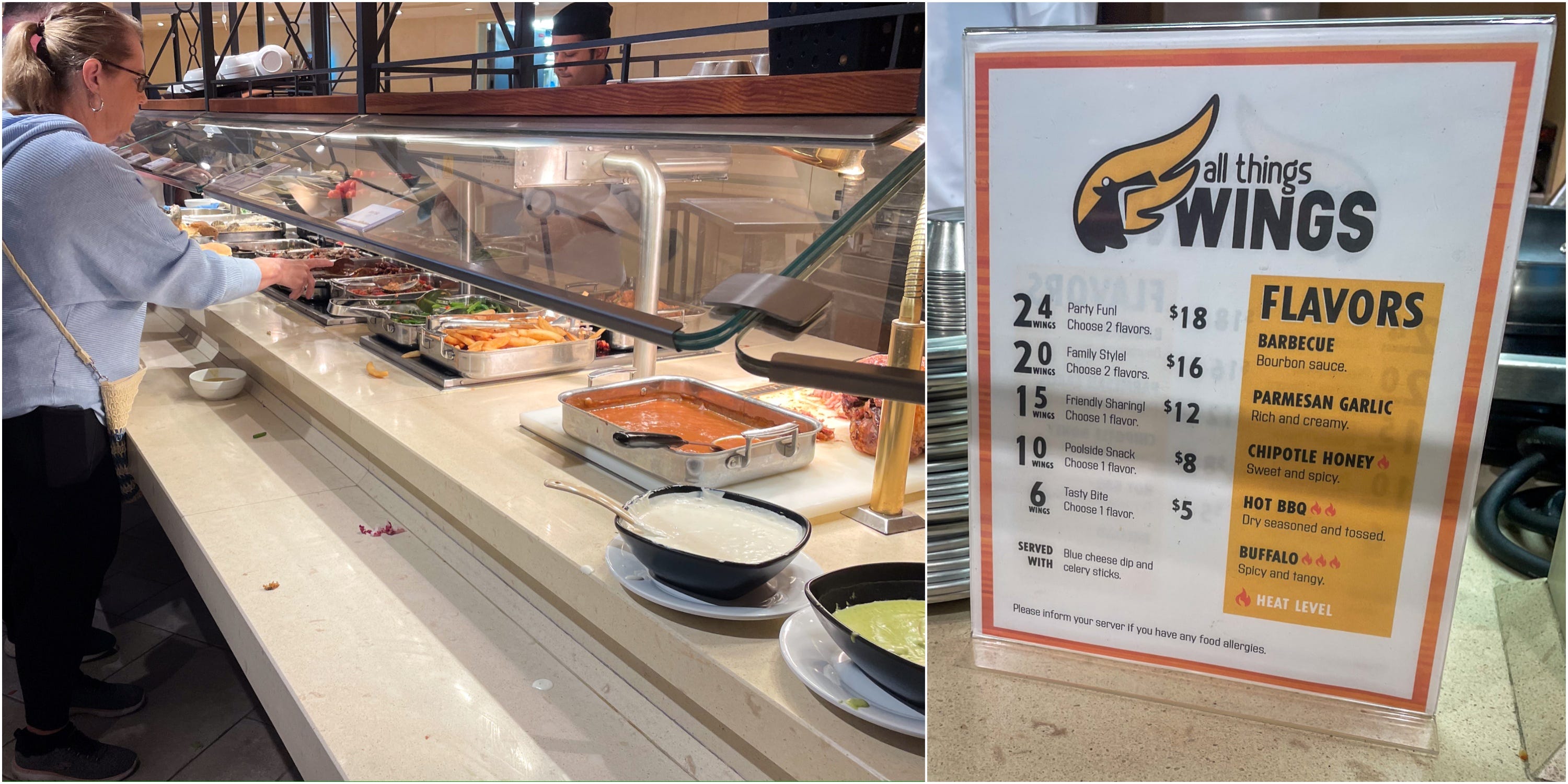
For lunch, I bounced around options like the Guy Fieri-branded burger shack and the pizza, Italian-Mexican fusion, and Italian sandwich stands.
My no-spend requirement meant I had to snub the almost $40 teppanyaki lunch, $1.50-a-piece empanada, and $6 Korean barbecue steak pizza (the pizza stand had free and upcharged pies).
That meant none of my lunches were standouts. The burgers were too heavy (mine came with a slab of fried mozzarella), the salsa verde at the sandwich stand was inedible, and the buffet was forgettable.
Even worse, the chicken wings at the buffet cost extra. Oh, Carnival.
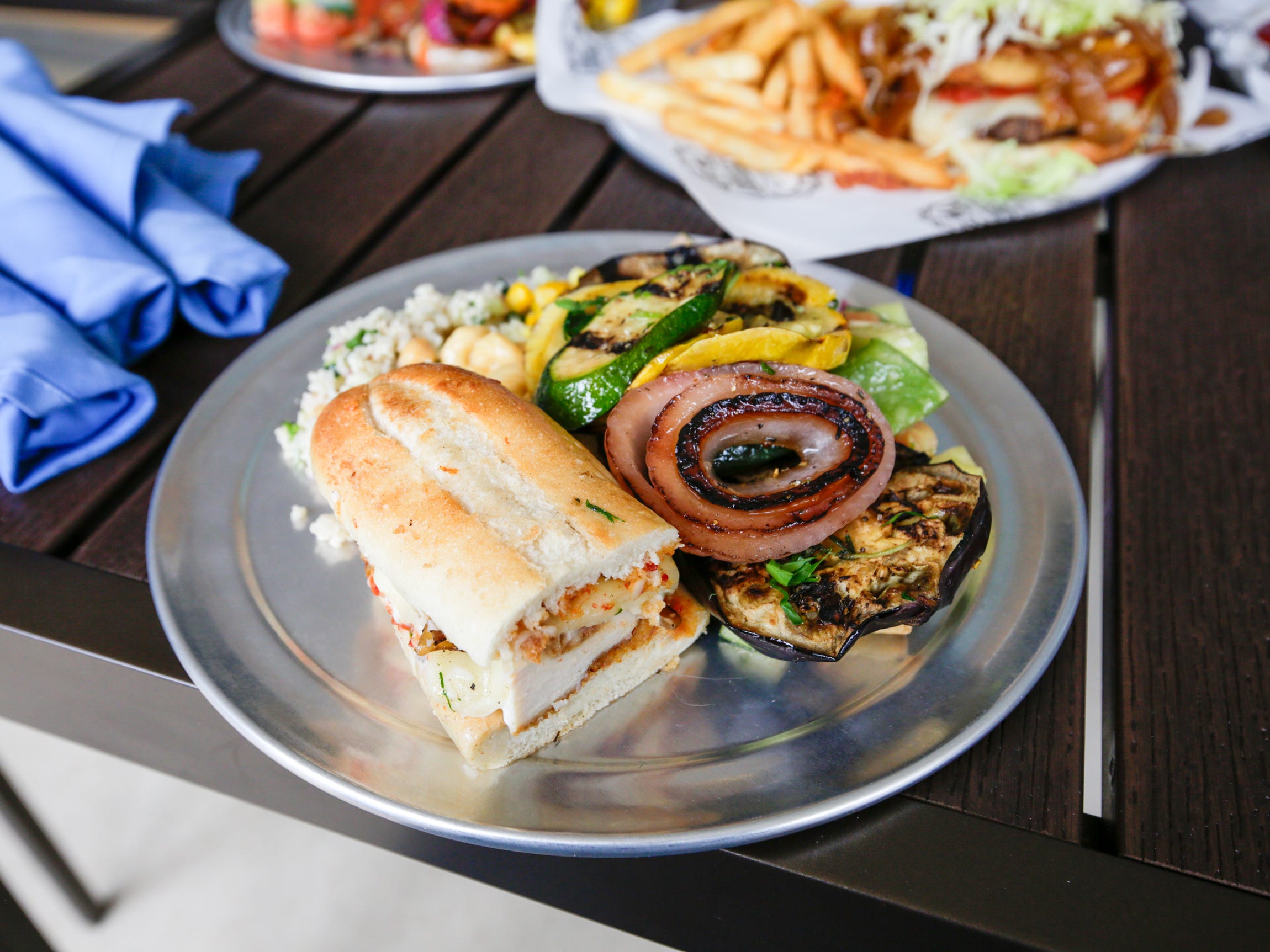
The only craveable lunch was at La Strada Grill, a tucked-away buffet with sandwiches and fresh vegetables.
It was the only light and fresh meal I had on the ship. I couldn't understand why it and another salad stand were closed until the last day of the cruise.
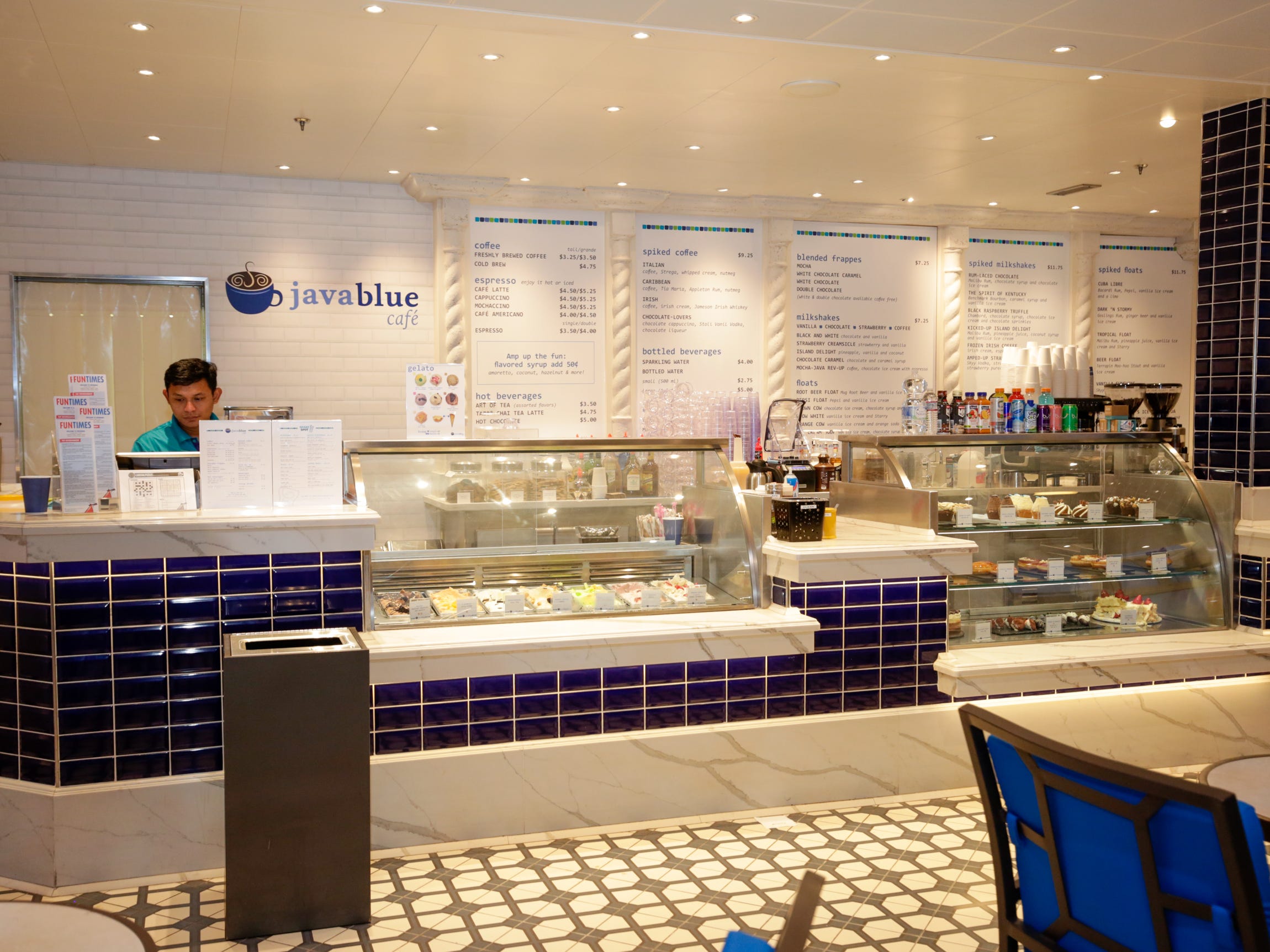
At that point, I had already grown tired of all the heavy foods.
But a quick pick-me-up at the coffee shop would have required me to break my no-spend rule, too.
The buffet had free coffee, Lipton, and Bigelow's green tea bags. But if you want something closer to your neighborhood coffee shop, the onboard café charges $4.50 for a latte and $4 for a doughnut.
I don't remember the last time I drank that much Lipton tea.

Activities like the afternoon 'Tea Time' also had a cost barrier.
Tea bags at the program were $1.50, unbeknownst to me until I was seated. After expressing disinterest in paying, I was later offered the buffet's teas.
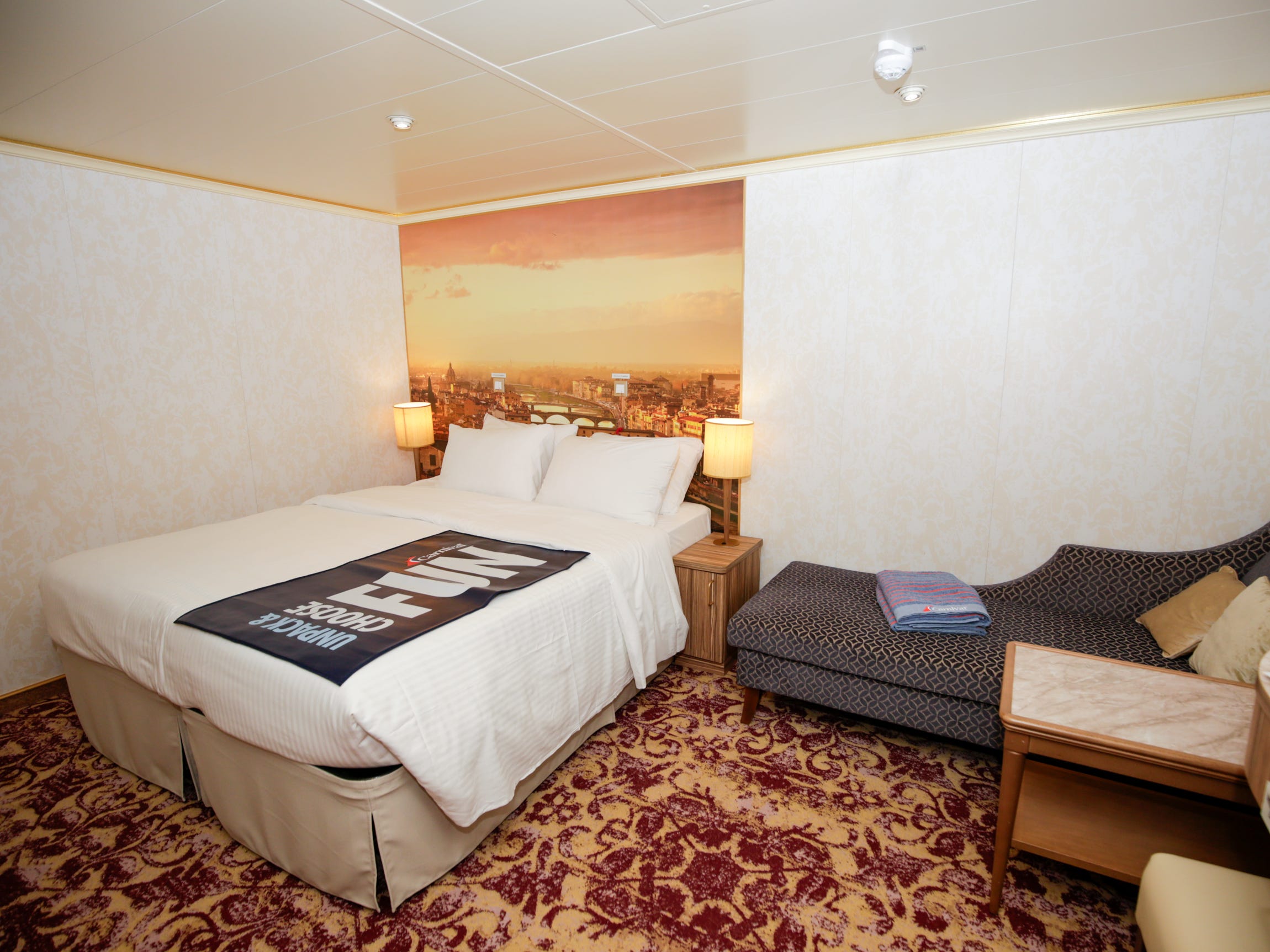
Caffeine might be mandatory if you stay in the cheapest windowless cabin.
Like any mass-market cruise ship, the most affordable option was a windowless interior stateroom and letting Carnival assign me my cabin.
Traveling alone for work meant I had to eat the solo supplement . My interior cabin, booked fairly last minute, cost $735, including $64 in optional gratuities.
But in 2024, the cheapest itinerary starts shy of $360 per person, including taxes and fees, for the same four-night sailing — from Long Beach, California, to Catalina Island and Ensenada, Mexico — as the one I went on.
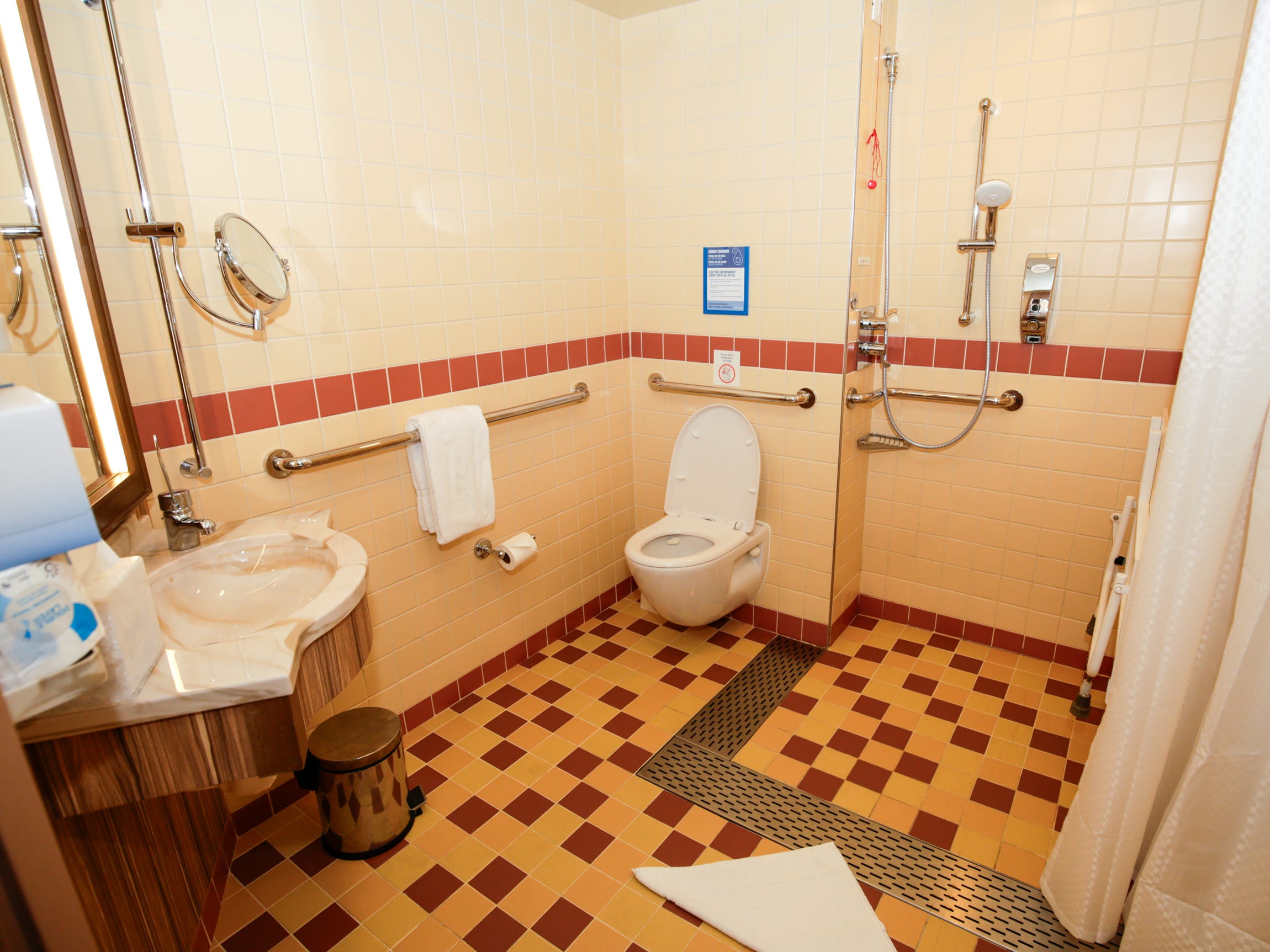
Carnival put me in one of Firenze’s accessible, wheelchair-friendly rooms.
This meant the shower — a curtain surrounding floor drains — was one of the largest I've had at sea. And all the furniture came pushed against the wall, making the cabin feel spacious for someone without physical disabilities.
But where the stateroom excels in size, it fails in design.
It was one of the ugliest rooms I've ever stayed in. The furniture looked dated, the bathroom had almost no storage, and there were no bedside outlets.
That said, the starting price of $90 a day is hard to beat. At least it encouraged me to spend more time around the ship than inside my windowless dungeon.
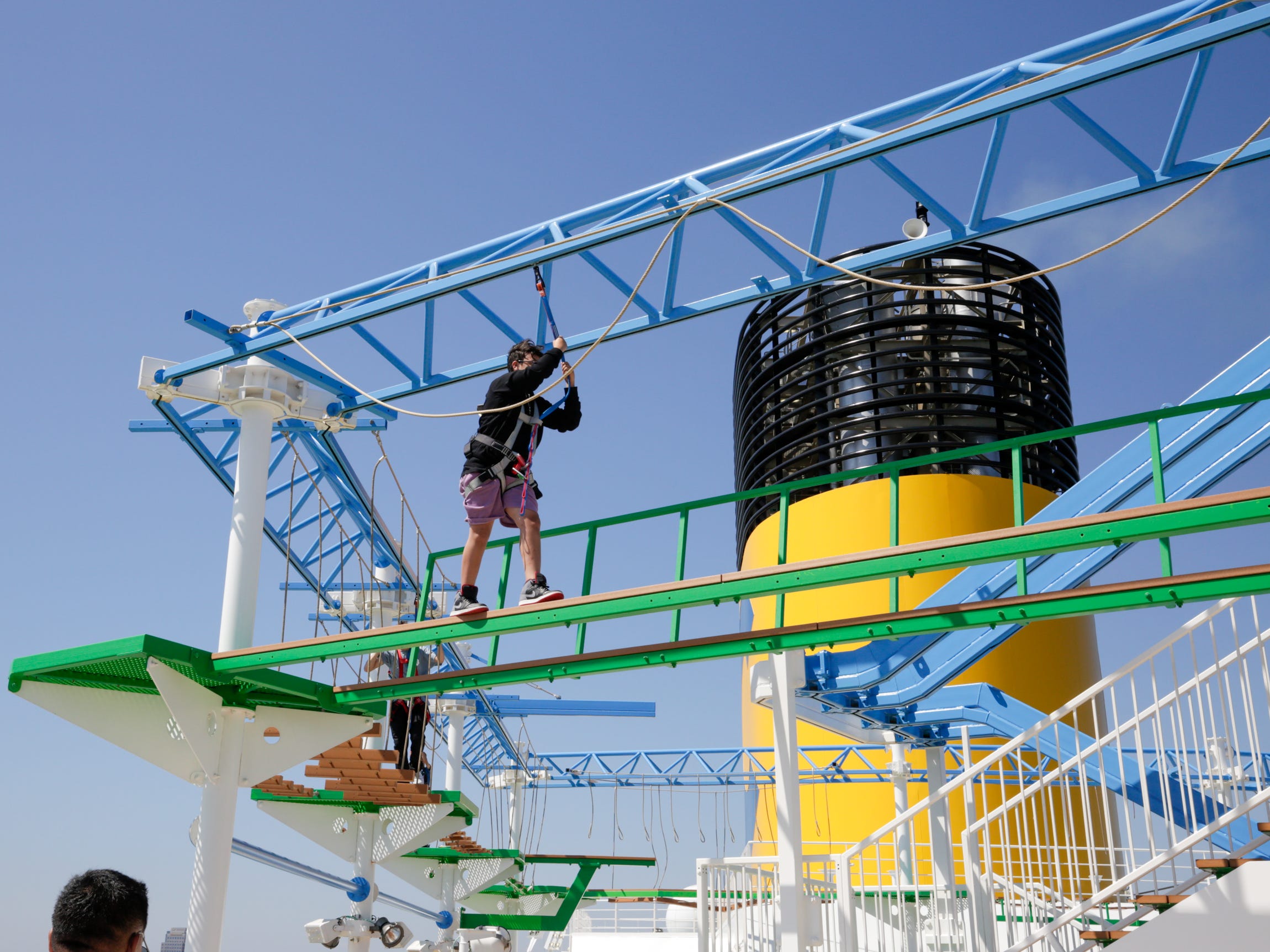
Overall, my no-spend Carnival Firenze cruise was fine. Not amazing. Not life-changing. Just fine.
The surplus of complimentary onboard activities rivaled that of more expensive ships. But if my meals weren't lackluster, they were bad.
I'm sure I would have a different review if I had spent an additional $50 on the steakhouse or $100 on the chef's table . But the less-than-desirable complimentary food ultimately plagued my four nights at sea.
If you're considering cruising on Carnival Firenze , I'd recommend paying for at least one of the specialty restaurants. The money will be worth skipping the buffet and uninspiring dining room.
More for You
Trump and Biden's first presidential debate of 2024, fact checked
A new restaurant won’t serve customers under 30. Could its policies catch on?
Brett Kavanaugh Warns Supreme Court Decision Will Cause 'Too Much Harm'
‘This is my money’: Maryland senior slams Social Security for taking $233 from her monthly retirement benefits due to legacy error on brother’s account
This U.S. State Is One of the Best Places to Retire for Low Crime, Taxes, and an Affordable Cost of Living
20 Incredibly Trivial Reasons Actors Landed Iconic Roles
Dick Van Dyke on Ageist Knocks Against Joe Biden: "I've Got All My Marbles, and I'm Old Enough to Be His Father"
Map reveals best places to live in the US if nuclear war breaks out
15 Of The Unhealthiest Store-Bought Pastas
Best Superman TV Series
The No. 1 question to never ask in a job interview, says CEO who's interviewed hundreds: 'You risk sending the wrong message'
A North Korean Missile Explodes in the Sky—and a Mystery Emerges
Here’s why Americans drive on the right and the UK drives on the left
People Who've Gone Through Divorce Are Sharing The Valuable Lessons They Learned, And Their Honesty Is Refreshing And Empowering
Woman Keeps Getting Mystery Packages She Never Ordered
Be Careful: These Android Apps Are Installing Malware, Stealing Your Data
Top 10 most expensive US states to live in – see if yours makes the list
5 Store-Bought Meatloaf Meals To Buy And 5 To Avoid, According To Customer Reviews
Scientists make battery technology breakthrough that could impact everything from smartphones to EVs: 'We are paving the way for next-generation batteries'
Black Americans demand to know what ‘Black jobs’ are after Trump debate comment

Welcome to a new era of travel convenience and affordability. T.B. TRAVEL CLUB

We will make your vacations unforgettable!

T.B. TRAVEL CLUB
Your vacations.

Reduce Reduce stress and anxiety levels. Improve your sleep and lose weight!
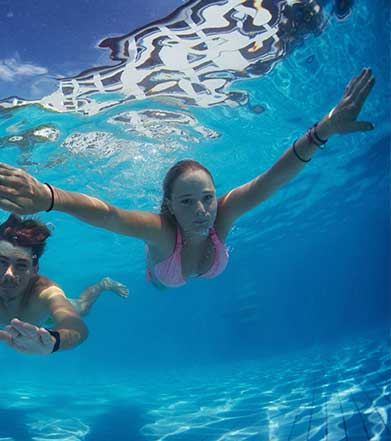
Recharge Recharge your good energy. Life looks different after we take some time off.

Renovate Renovate your vows and make sparks fly again! Recuperate time lost with your family!

Reinvent Reinvent yourself! shake of depression, sit on the beach and set new goals!

Become Become more productive. Studies have shown an increase on creativity and satisfaction increase upon taking a vacation.

Relieve Relieve the stress that takes a toll on our health. During your vacation you can laugh, dance, swim, run, dive feel and stay young. Invest in your well being.
Membership benefits.
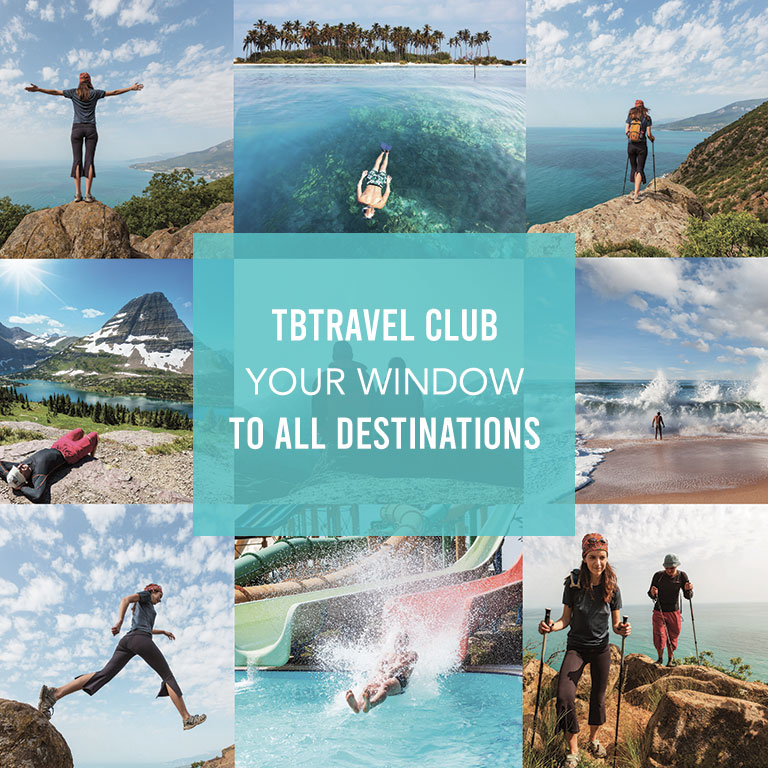
Your window too all reservation

Hotels Up to 50% off from public OTA
Book by November 30, 2020 to travel by December 31, 2021

for easier access

35,000 activities
around the world
TB Travel Club Affiliated Resorts
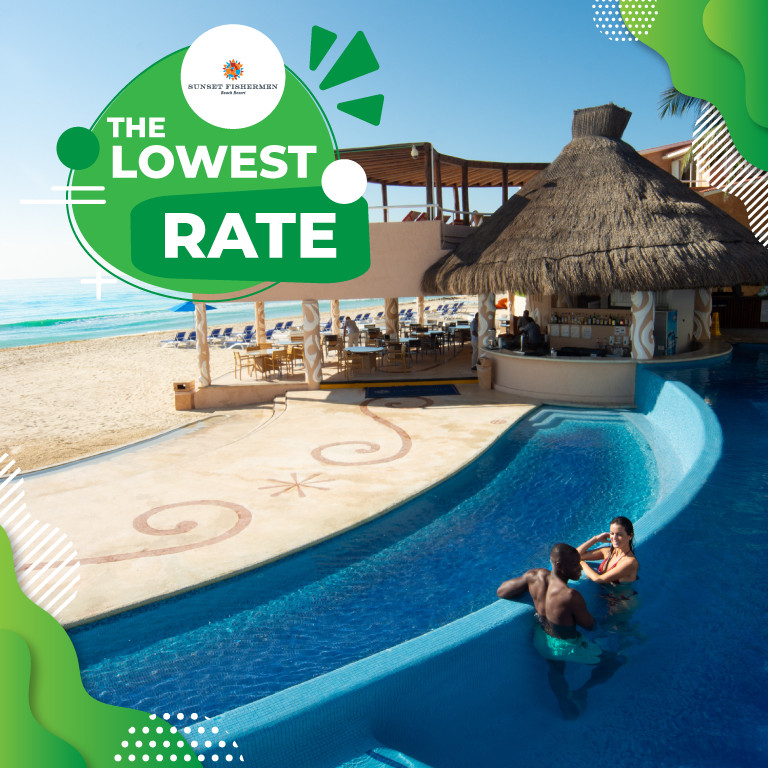
Sunset Fishermen
This is a one- and only-time promotional offer
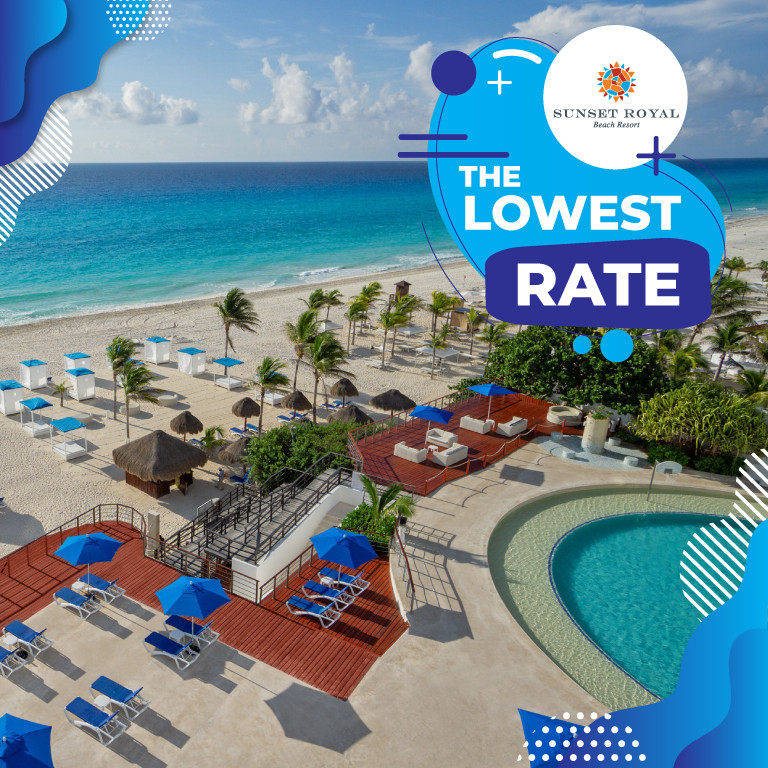
Sunset Royal

Hacienda Tres Ríos
Reservation request.
Please complete the form with your request for spa treatment and we will contact you do confim availability.
Require fields (*)
Morning Afternoon Evening
Repeat Guest New Guest
Male Female
Privacy Policy
Naviera Dorada S.A. de C.V. hereinafter referred as “Sunset Admiral Yacht Club Y Marina”, with address in Boulevard Kukulcán Kilómetro 5.8 MZ-37 LT-18 SECC-C, Zona Hotelera, CP 77500, Cancún, Quintana Roo, Mexico, is responsible for the collection and use of the personal data required from customers, in terms of the rules established by the Mexican Federal Law for Data Protection of Private Individuals (Ley Federal de Protección de Datos Personales en Posesión de los Particulares – LFPDPPP ) as well in the rules established by articles 1, 3 and 5 of the General Data Protection Regulation (EU) 2016/679 (GDPR).
II. Data collected and use of the information requested from our customers.
In accordance with the rules established by LFPDPP and GDPR, we inform you that the personal data collected through our formats, by telephone or by electronic means (online) through our website, such as: name, phone number, email, home city, country, the national identity document, passport or the national voting card issued by National Electoral Institute (INE), will be used for the following essential purposes:
a) General Data
i. Provide and administrate the services contracted by our customers (rent of yachts, fishing boats and water scooters); ii. To lease stay spaces for vessels. iii. Register their information in our systems and databases; iv. To comply with the different laws that regulate our services and activities; v. To confirm, verify, correct and update their personal data; vi. To hire the insurance policies required by law; vii. To administrate the reservations requested by our customers; viii. To charge for our services and for the collection efforts with respect to receivables that are not paid when due; ix. To charge for services and programs paid electronically with a credit card; x. To charge any additional expenses or fees for extra services contracted, and;
Additionally, this information can be used for the following non-essential purposes:
a) To send customers: offers, discounts, special fees and other benefits; b) For statistical purposes; and, c) For promotional and marketing purposes.
b) Financial and Patrimonial Assets Data
The financial and patrimonial data collected such as insurance policy and vessel invoice, will be used to sign the lease contract of stay spaces for vessels. According to Mexican Privacy Law, is required to obtain express consent of customers in order to use and process their financial and patrimonial assets data for the different purposes and uses described above. Therefore in compliance with the law, we will request your express authorization in written at the moment of the data collection, informing you the legal consequences of their decision to grant it or not.
III. Data transfer.
The personal data collected by “Sunset Admiral Yacht Club Y Marina” can be transferred to companies that help provide some of the goods and services requested by our customers, which is necessary to comply with the provision of services that are contracted, so this information will be send to these providers in compliance with the provisions stated in article 37, section VII of the LFPDPPP, as well as the provision contained in article 49 of the GDPR.
Except for the cases indicated above, and unless the conditions set by articles 37 of the LFPDPPP and 49 of the GDPR are being materialized, the data provided by our customers will not be transferred under any circumstances.
IV. Restrictions on the use or disclosure of personal data
In Accordance to the articles 16 section III of the LFPDPPP and article 18 of the GDPR , those who wish to limit the use and disclosure of their personal data, or who no longer wish to receive communications regarding the non-essential purposes detailed in this privacy notice, must send an email to the adress: [email protected] requesting stop being contacted for these purposes.
V. Withdrawal of consent and rights of Access, Rectification, Cancellation and Opposition.
As stated in the LFPDPPP as of January 6, 2012, as well as in Articles 15, 16, 17, 18 of the GDPR, the owners of personal data collected by “Sunset Admiral Yacht Club Y Marina” may request: access, correction, cancellation (should this be legally appropriate) and opposition of the use of their personal data, as well as to withdraw their consent. To exercise these rights, they must follow this procedure:
1) They must send an application by email to our Privacy Office at [email protected] stating the right they want to exercise: access, correction, cancellation and/or opposition, which must indicate their full name, the legal or commercial relationship with “Sunset Admiral Yacht Club Y Marina” the type of right they wish to exercise, accurately identifying the data for which they request access, correction, cancellation or opposition, or those for which they decide to withdraw their consent, attaching any of the official identification documents (valid passport or current immigration document), in order to prove their identity
2) In the case of personal data whose owners are underage or people that cannot legally give consent themselves, this request must be made by the person who legally represents their rights, either through the accreditation of parental rights; or through his/her legally appointed guardian or tutor.
3) Data owners must send their application for the exercise of the aforementioned rights and may attach all the documents that are relevant to their request. For correction applications, it will be necessary to precisely specify the changes requested, including the documentation that supports their claim.
4) Applications for the exercise of these rights must be submitted during working hours and on business days in accordance with the Federal Law of Administrative Procedure.
5) The request must be sent to the email address mentioned in numeral 1) and an acknowledgment of receipt will be sent with the corresponding date of receipt. Should the application not fulfill the legal requirements, we will contact the holder within five (5) business days to ask to amend the application for up to ten (10) business days. Otherwise, the application will be considered as not submitted.
6) In the event that the request has been sent on Friday or on a non-business day, it may be received on the following business day after it was sent.
7) The request will be answered via email within a period of twenty (20) business days from the date of receipt. This period may be extended for twenty (20) additional business days when there are adequate reasons, and this situation will be notified to the holder under the terms of the provisions of Article 97 of the LFPDPPP Regulations.
8) In the event that the request is made in accordance with the LFPDPPP and other current regulations, access will be granted, the data will be corrected or canceled, the right of opposition will be effective or the consent will be revoked, within fifteen (15) business days following the date on which the request was answered. This period may be extended for fifteen (15) additional days for adequate reasons, and this situation will be notified to the holder under the terms of the provisions of Article 97 of the LFPDPPP Regulations. 9) In all cases where the request is appropriate, in accordance with the terms of Articles 32, 33, 34 and 35 of the LFPDPPP, the data will be sent free of charge through the holder’s email address for said purpose. In case the information should be required to be sent through another form of delivery, payment must be made for the cost of shipping and/or the cost of reproduction of copies or other formats that may be incurred.
9) In all cases where the request is appropriate, in accordance with the terms of Articles 32, 33, 34 and 35 of the LFPDPPP, the data will be sent free of charge through the holder’s email address for said purpose. In case the information should be required to be sent through another form of delivery, payment must be made for the cost of shipping and/or the cost of reproduction of copies or other formats that may be incurred.
VI. Online data management
This section describes the use of your personal data in the following website: https://tbtravel.club/experiences/sunset-admiral/
Online Privacy Policy
Our policy regarding the information related to the use of our website is described below. You should review this Privacy Policy regularly because it may change at any time at our discretion.
When you access to “Sunset Admiral Yacht Club Y Marina” website, we register your IP address (which is usually temporary and is assigned by your internet service provider when you log in), as well as the type of operating system and browser you use. In addition, we can trace the pages of the site you are visiting. The information we collect is used to improve our website’s user experience, and the whole process takes place without any knowledge of your name or any other information that will allow us to identify you. While visiting “Sunset Admiral Yacht Club Y Marina” website, your navigation is anonymous unless you decide to identify yourself to us.
“Sunset Admiral Yacht Club Y Marina” does not require that you provide personal data to use our website, unless it is necessary. Some applications may require you to disclose any personal information, our contact forms may require your email address to register and answer your comments, requests, questions or suggestions, and contact you if necessary. On these forms, we will not require your name, financial or property data, and/or sensitive data. Any disclosure of this information is your responsibility. Regardless of the above, if you voluntarily provide any of this information, “Sunset Admiral Yacht Club Y Marina” assures it will be used with strict confidentiality.
A cookie is information that an internet portal sends to your computer and is stored on your hard drive. The next time you visit our site, we may use the information stored in the cookie to facilitate the use of our websites. A cookie does not allow us to know your personal identity unless you explicitly choose to provide it. Most cookies expire after a short period of time or can be deleted by you at any time. Also, you can configure your browser to notify you when you receive a cookie so you can accept or reject it.
Social Networks
The personal data and information posted by the users of our social media is published on their own account and is subject to the terms and conditions established by the social media provider. “Sunset Admiral Yacht Club Y Marina” will use this information to answer the requests and questions asked by the users and to contact them in case they request it.
The contact data of the users who request information about travel packages, tours and other services will be shared with our Customer Service Center to give them a personalized attention by email or phone. The information provided by those users who decide to participate in our contests will be used to contact them in case they win, and their image may be published.
Data Portability
In Accordance with article 20 of the GDPR, you have the right to transfer your personal data to another supplier or controller without hindrance from the controller to which the personal data has been provided as long as the legal processing of your data has been carried out by automated means. “Sunset Admiral Yacht Club Y Marina”, ensures the strictest confidentiality and security to carry out the data transfer.
VII. Complaints regarding the use of your personal data.
If you believe that your rights regarding the protection of your personal data have been violated by any conduct, act or omission regarding the attention of your requests or in the use of your personal data, you can submit a complaint with the National Institute for Access to Information and Data Protection (INAI). For more information you can visit the website: www.inai.org.mx .
VIII. More Information – Privacy Office.
If you have any questions regarding the content, interpretation or scope of this Privacy Notice, if you need more information regarding the use of your personal data, please contact us through our Privacy Officer at the following email address: [email protected]
This Privacy Notice is effective from January 1st of 2012 and may be modified on a discretionary basis by “Sunset Admiral Yacht Club Y Marina”, under the terms of the LFPDPPP and its regulations, if you have any questions regarding to the content, interpretation or scope of this Privacy Notice, or you need more information regarding the use of your personal data, please contact our Privacy Office.
Last Updated: October 1st, 2020
Please contact us beforehand to receive important information.
If you reserved through a travel agency or directly with us call:
USA & CAN 1 800 494 9173 MÉX 01 800 890 7270 REST OF THE WORLD +52 (998) 881 4602
If you are a Member call
USA & CAN 1 (866) 760 1842, 1 (800) 896 1243,1 (800) 961 5089 MÉX 01 (800) 262 9648 COL 01 (800) 913 4927 REST OF THE WORLD +52 (998) 881 8750
If you reserved through RCI call: 01 800 681 6958
Reservations Cancún : Alberto Morales ext. 6462 Reservations Riviera Maya : Guillermo Rosales ext. 6184 Iliana Montembruck ext. 6145
Políticas de Privacidad
I. Responsible for the protection of your personal data. Hotelera Malecón S.A. de C.V. hereinafter Royal Sunset with address in Boulevard Kukulcán, kilometer 10 Apple 51, Lote 13-B Zona Hotelera, Zip Code 77500, Cancún Quintana Roo México, is responsible for the collection and use of the personal data required from the customers, visitors and vacational member club, in terms of the rules established by the Mexican Federal Law for Data Protection of Private Individuals (Ley Federal de Protección de Datos Personales en Posesión de los Particulares LFPDPPP) as well in the provisions of the articles 1º, 3º and 5º of the General Data Protection Regulation (EU) 2016/679 (GDPR) .
The personal data and documents collected from our customers at the resort, in our Website, online services or by phone, will be used to start, management and maintenance of ours services and to send discounts, offers and promotions in terms of what is stated in this section.
The general data requested in our forms such as: name, gender, signature, home address, phone number, cell phone number, e-mail, date of birth, job, home city, economic dependents, country, national identity document or passport will be used for the following essential purposes:
i. Provide all our services; ii. Include the information of our customers in our systems and databases to provide and administrate the services contracted; iii. Carry out the check-In and Check-out; iv. To comply with the different laws that regulate our services and activities; v. To attend complains, doubts and provide information to our customers, related to transportation, reservations or cancellations received by our Call Center; vi. To confirm, verify, correct and update your personal data; vii. For the administration of the services all inclusive, European plan and day pass viii. For the charge of our services and the collection efforts with respect to receivables that are not paid when due; ix. In order to do the charges on-line of the services and programs paid with credit card; x. To charge any extra charges or additional fees for extra services contracted by our customers and, xi. For the proper identification of our guests and customers.
a) To send our customers offers, discounts, special fees and other benefits; b) Spa Service c) Babysitting service d) To carry out wedding, banquets, and Honeymoon Service e) Gym Service f) Restaurant and Bar service g) Medical attention h) Transportation services i) Currency exchange j) For statistical purposes; and, k) For promotional and marketing purposes
The financial and patrimonial data collected such as credit card number, bank account, monthly income and additional incomes, will be used to purchase our wedding services and events, to purchase our vacation packages, to make reservations, to administrate our European plan analyze the financial profile of our guests and customers in order to grant them access to promotions and programs based on their economic characteristics. Furthermore, additional financial data and information related to the patrimonial assets of the clients may be required in compliance of Mexican Federal Law to prevent money laundering (Ley Federal para la Prevención e Identificación de Operaciones con Recursos de Procedencia Ilícita LFPIORPI).
According to Mexican Privacy Law, is required to obtain express consent of guests and customers in order to use and process their financial and patrimonial assets data for the different purposes and uses described above. Therefore, in compliance with the law, we will request your express authorization in written at the moment of the data collection.
c) Sensitive Data
The sensitive data collected such as health condition (allergies, disease, asthma, injuries, any illness) in our health questionnaire, babysitting service and medical care, will be used to value your health condition in order to purchase and carry out our services such as spa services, babysitting services and medical care.
According to the LFPDPPP article 9º and the provisions contained in article 9 (2.a) of the GDPR is required to obtain express consent of guests and customers in order to use and process their sensitive data for the different purposes and uses described above. Therefore, in compliance with the laws, we will request your express authorization in written at the moment of the data collection.
The personal data collected by Royal Sunset can be transfer to companies that help to provide some of the services requested by our customers. These data transfer is necessary to comply with the contract and therefore express consent is not necessary for these transferences.
Out of these cases and unless one of the provisions stated in article 37 of the LFPDPPP and in the provision contained in article 49 of the GDPR are met, the data provided by our guests, customers or vacation members club, will not be transferred under any circumstances to third parties.
IV. Use of images.
Events : In order to document and communicate information about the activities and events held throughout the year in the resort, as well as news Royal Sunset can use, print, reproduce and publish the images of our guests, visitors, vacation members club and customers and their friends or family that attend our activities in print or electronic media, newsletters, publications, photographic memories, in all its forms and expressions, performances, editions, phonograms, video and emissions for the purposes indicated. These images will not be commercially exploited by Royal Sunset .
Secondary Purposes
The information that we collect from our guests, vacation members club, and customers may be used for advertising, marketing and/or market research, according to the relationship existing between them and Royal Sunset . When Royal Sunset pretends to use the images for these purposes, the company will request your express authorization in written before its use.
V. Restrictions on the use or disclosure of personal data.
In Accordance to the articles 16 section III of the LFPDPPP and article 18 of the GDPR , If our customers do not wish to receive communications or advertising by Royal Sunset at any time they can: Subscribe their data in the “do not call list” (REPEP for its acronym in Spanish), administrated by the Bureau of Consumer Protection (PROFECO). For more information visit http://rpc.profeco.gob.mx/ ; or, send an email to the address [email protected] requesting stop being contacted for these purposes.
VI. Rights of access, rectification, cancellation and opposition, and withdrawal of consent.
As stated in the Federal Personal Data Protection Law and in the General Data Protection Regulation, customers may request the access, rectification, cancellation, oppose to the use of their personal data provided to the responsible, or revoke their consent. Their request will be answered by our Privacy Officer, through this email address: [email protected] To exercise these rights of access, rectification, cancellation, opposition, and to revoke the consent, the following procedure must be followed: 1) Send an email to the address [email protected] with your full name, your legal or commercial relationship with Royal Sunset , (for example guest or customer), and if you want to exercise your right of access, rectification, cancellation, opposition or revoke your consent. 2) Fill the application form that our Privacy Officer will send you, identifying the data on which you request the access, rectification, cancellation, opposition or the revoke of your consent, providing a copy of any of the identifications mentioned in the form in order to prove that you are the owner of the data or its legal representative. 3) After filling this form you must sent it to the e-mail address indicated in the previous paragraph, attaching all the documents that are relevant to answer your request. For “rectification” applications it will be necessary to specify the changes to be done, including the documentation that supports your request. 4) Once your request is received we will send you a notice with the file number and date of receipt. If your applicarion does not fulfill the legal requirements we will contact you within five business days of the receipt date informing you this situation. You will have ten business day to provide the information or documents required, otherwise your application will be considered as not submitted. 5) If your application was sent on a saturday, sunday or non-working day, it will be received the following working day. 6) Your request will be answered via e-mail in a period of twenty working days from the date of receipt. This period may be extended for twenty additional days for proper reasons, this situation will be notified to you in terms of the provisions of Article 97 of the LFPDPPP Regulations. 7) If your application is accepted we will give you access, rectify or cancel you data, register your opposition to the use of your information or revoke your consent within the fifteen business days from the date on which we answer your request. 8) This period may be extended for fifteen additional days for proper reasons, this situation will be notified to you in terms of the provisions of Article 97 of the LFPDPPP Regulations. 9) When your application is accepted, in terms of Articles 32, 33, 34 and 35 of the LFPDPPP we will sent your data without any charge through your email address, in case you request or need another form of delivery you will have to pay for the cost of shipment and/or the cost of reproduction of copies or other formats.
VII. Online data management.
This section describes the use of your personal data in the following website: – https://tbtravel.club/resorts/sunset-royal-beach-resort/
Our policy regarding the information related to the use of our website is described below. You should review this Privacy Policy regularly since it may change at any time at our discretion. When you access the website of Royal Sunset , we register your Internet address (this address usually is temporary and is assigned by your Internet service provider when you log in), the type of operating system and browser you use. In addition, we can trace the pages of the site that you are visiting. The information we collect is used to improve the users experience of our website, the whole process is done without any knowledge of your name or any other information that will allow us to identify you. While visiting the website of Royal Sunset , unless you decide to identify with us, your navigation is anonymous.
Royal Sunset , does not require that you provide personal data to use our website, unless necessary. Some applications may require you to disclose any personal information, our contact forms may require your email address to register and answer your comments, requests, questions or suggestions, and contact you if necessary. In these forms we will not require your name, financial, patrimonial and/or sensitive data, any disclosure of this information is your responsibility, regardless the above, if you voluntarily provide any of this information Royal Sunset assures it will be used with strict confidentiality.
Cookies : A cookie is information that an Internet portal sends to your computer, which is stored on your hard drive. The next time you visit our site, we may use the information stored in the cookie to facilitate the use of our website. A cookie does not allow us to know your personal identity unless you explicitly choose to provide it. Most cookies expire after a period of time or can be deleted by you at any time. Also you can configure your browser to notify you when you receive a cookie so you can accept or reject it.
Our website uses cookies to provide a personalized and secure experience to our users as well as to show users advertising related to their preferences. Cookies allow us to understand the behavior of our users on the site and improve it. If you decide to navigate our website, we understand that you consent to the processing of your personal data in accordance with “our online privacy policy” described in our Privacy Notice.
The data and information posted by the users of our social network, is published on their own account and is subjected to the terms and conditions established by the social network provider. Royal Sunset will use this information to answer the requests and questions asked by the users and to contact them in case they request so.
The contact data of the users that request information about travel packages, tours and other services will be shared with our Customer Service Center to give them a personalized attention by e-mail or phone. The information provided by those users who decide to participate in our contests will be use to contact them in case they win and their image may be published.
In Accordance with the article 20 of the GDPR , you have the right to transfer your personal data to another supplier or controller without hindrance from the controller to which the personal data have been provided as long as the legal processing oy your data has been carried out by automated means. Royal Sunset ensures the most strict confidentiality and security to carry out the data transfer.
VIII. Complaints regarding the use of your personal data
If you believe that your rights regarding the protection of your personal data have been violated by any conduct, act or omission regarding the attention of your requests or in the use of your personal data, you can submit a complaint with the National Institute for Access to Information and Data Protection (INAI) , for more information visit www.inai.org.mx
IX. More Information – Privacy Office.
If you have any questions regarding the content, interpretation or scope of this Privacy Notice, or need more information regarding the use of your personal data, please contact us through our Privacy Officer , at the following email address: [email protected] donde será atendido.
X. Updates.
This Privacy Notice is effective from January 1º of 2012 and may be modified on a discretionary basis by Royal Sunset , in terms of the GDPR and LFPDPPP and its regulations, any amendment will be communicated by posting the new Privacy Notice in of our website listed in the VII section of this Privacy Note, and in the Resort Lobby.
Last Update: December 1, 2018.
To Become a Sunset World Member, Request a Resort Preview
If you would like more information on Sunset World Resorts & Vacation Experiences Ownership, or if you would like us to contact you about a resort preview at one of our timeshare resort properties, please call us at 1 800 658 3141, write to us at [email protected] or fill out the form below.
Contact Information
I expressly consent and request that Sunset World Resorts & Vacation Experiences and its related and affiliated entities contact me at the number listed above using an automated telephone dialing system, prerecorded message, electronic mail or SMS text message, regardless of any prior election to the contrary. I acknowledge and agree that I am not required to sign this agreement as condition of purchasing any property, goods or services.
Preferred Date of Travel
I. Responsible for the protection of your personal data.
Promotora Sunset Beach Club S.A. de C.V. hereinafter referred as Promotora Sunset , with address in Boulevard Kukulcán, kilometer 10 Apple 51, Lote 13-B Zona Hotelera, Zip Code 77500, Cancún Quintana Roo México, is responsible for the collection and use of the personal data required from the vacational member club, in terms of the rules established by the Mexican Federal Law for Data Protection of Private Individuals (Ley Federal de Protección de Datos Personales en Posesión de los Particulares LFPDPPP) as well in the provisions of the articles 1º, 3º and 5º of the General Data Protection Regulation (EU) 2016/679 (GDPR) .
Personal data collected through physical formats in hotels, by telephone, or by electronic means (online) through our websites, will be used to begin, administer and maintain the services offered to our vacational members club.
- Begin providing services that customers contract with the company;
- To upload our vacational member club ´s information into our systems and database to provide and administer the services contracted
- To create our vacational member clubs ´electronic and paper files;
- Carry out the verification of your personal data collected by our Call Center;
- To comply with the different laws that regulate our services and activities;
- To deal with complaints and inquiries, and to provide our customers with information related to travel reservations or cancellations received by our Call Center;
- To confirm, verify, correct and update the personal data;
- Carry out the sign of the contract;
- To administrate your personal data in the sales room and contracting Area;
- To charge for our services and for the collection efforts with respect to receivables that are not paid when due;
- To charge for services and programs paid electronically with a credit card;
- To charge any additional expenses or fees for extra services contracted, and;
- To properly identify our clients as vacational members club or guests.
- a) To send our vacational member club offers, discounts, special fees and other benefits;
- b) To improve our holiday offer by sending your information to our business partners;
- c) For statistical purposes; and,
- d) For promotional and marketing purposes.
The financial and patrimonial data collected such as credit card number, bank account, monthly income and additional incomes, will be used to analyze the financial profile of our vacational members club and customers in order to grant them access to promotions and programs based on their economic characteristics. Furthermore additional information may be required in compliance of Mexican Federal Law to prevent money laundering (Lay Federal para la Prevención e Identificación de Operacions con Recursos de Procedencia lícita LFPIORPI).
According to Mexican Privacy Law, is required to obtain express consent of guests and customers in order to use and process their financial and patrimonial assets data for the different purposes and uses described above. Therefore in compliance with the law, we will request your express authorization in written at the moment of the data collection, informing you the legal consequences of their decision to grant it or not.
The personal data collected by “ Promotora Sunset ” can be transferred to companies that help provide some of the goods and services requested by our customers, which is necessary to comply with the provision of services that are contracted, and also can be transferred to companies who elaborate profiles and consumer trends for our vacational members club, therefore it will not be necessary to have the express consent of the owner of the data for this transfer in accordance to Article 37, Section VII of the LFPDPPP, as well as the provision contained in Article 49 of the GDPR.
Except for the cases indicated above, and unless one of the assumptions contained in Article 37 of the LFPDPPP and 49 of the GDPR is updated, the data provided by our visitors, partners, guests, vacational members club and referred visitors will not be transferred under any circumstances.
Moreover, “ Promotora Sunset ” may use, print, reproduce and publish any captured image(s) of partners vacational members club, guests, beneficiaries and people referred in print, electronic media (blogs, private social networks such as Facebook, website) , in all its manifestations, its interpretations or executions, its editions, its phonograms or videograms, and in its broadcasts, in order to document journalistically and communicate information related to events that are celebrated, such as delivery of awards and rewards, be the images captured by “ Promotora Sunset ” itself or through external suppliers hired for these activities.
When any image of any guest, partners, family member, client, partner or referral is going to be used for advertising purposes, this situation will be notified to the owners, and their express consent will be required in a specific format, to indicate whether they accept the treatment of the images for these purposes.
The information that we collect from our guests, members and customers may be used for advertising, marketing and/or market research, according to the relationship existing between them and “ Promotora Sunset ”. When “ Promotora Sunset ” pretends to use the images for these purposes, the company will request your express authorization in written before its use.
In Accordance to the articles 16 section III of the LFPDPPP and article 18 of the GDPR , those who wish to limit the use and disclosure of their personal data, or who no longer wish to receive communications regarding the non-essential purposes detailed in this privacy notice, may at any time sign up for the “do not call list” (known by its Spanish acronym REPEP), which is administered by the Bureau of Consumer Protection (PROFECO). For more information visit http://rpc.profeco.gob.mx/ ; or, send an email to the address [email protected] requesting stop being contacted for these purposes.
As stated in the LFPDPPP as of January 6, 2012, as well as in Articles 15, 16, 17, 18 of the GDPR, the holders of personal data collected by “ Promotora Sunset ” may request to access, correct, cancel (should this be legally appropriate) and oppose the use of their personal data, as well as to withdraw their consent. To exercise these rights, you must follow this procedure:
1) Send an email to our Privacy Officer at [email protected] to request the application document for the exercise of rights to access, correct, cancel and oppose, which must be filled out with your full name, your legal or commercial relationship with “ Promotora Sunset ” the type of right you wish to exercise, accurately identifying the data for which you request to access, correct, cancel or oppose, or those for which you decide to withdraw your consent, attaching any of the official identification documents (valid passport or current immigration document), in order to prove the identity with which the request is made.
2) In the case of personal data whose holders are minors or incapable persons, this request must be made by the person who legally represents the rights of the minor or incapable person, either through the accreditation of parental rights; or through his/her legally appointed guardian or tutor.
3) Holders must complete the application for the exercise of the aforementioned rights and may attach all the documents that are relevant to their request. For correction applications, it will be necessary to precisely specify the changes to be created, including the documentation that supports the origin of the request.
8) In the event that the request is made in accordance with the LFPDPPP and other current regulations, access will be granted, the data will be corrected or canceled, the right of opposition will be effective or the consent will be revoked, within fifteen (15) business days following the date on which the request was answered. This period may be extended for fifteen (15) additional days for adequate reasons, and this situation will be notified to the holder under the terms of the provisions of Article 97 of the LFPDPPP Regulations.
This section describes the use of your personal data in the following websites: – tbtravel.club
Our policy regarding the information related to the use of our websites is described below. You should review this Privacy Policy regularly because it may change at any time at our discretion.
When you access “Promotora Sunset” website, we register your IP address (which is usually temporary and is assigned by your internet service provider when you log in), as well as the type of operating system and browser you use. In addition, we can trace the pages of the site you are visiting. The information we collect is used to improve our website’s user experience, and the whole process takes place without any knowledge of your name or any other information that will allow us to identify you. While visiting any “Yucatán Holidays” website, your navigation is anonymous unless you decide to identify yourself to us.
“Promotora Sunset” does not require that you provide personal data to use any of our websites, unless it is necessary. Some applications may require you to disclose any personal information, our contact forms may require your email address to register and answer your comments, requests, questions or suggestions, and contact you if necessary. On these forms, we will not require your name, financial or property data, and/or sensitive data. Any disclosure of this information is your responsibility. Regardless of the above, if you voluntarily provide any of this information, “Promotora Sunset” assures it will be used with strict confidentiality.
The data and information posted by the users of our social media is published on their own account and is subject to the terms and conditions established by the social media provider. “Promotora Sunset” will use this information to answer the requests and questions asked by the users and to contact them in case they request it.
In Accordance with the article 20 of the GDPR , you have the right to transfer your personal data to another supplier or controller without hindrance from the controller to which the personal data have been provided as long as the legal processing oy your data has been carried out by automated means. Promotora Sunset , ensures the most strict confidentiality and security to carry out the data transfer.
VIII. Complaints regarding the use of your personal data.
If you believe that your rights regarding the protection of your personal data have been violated by any conduct, act or omission regarding the attention of your requests or in the use of your personal data, you can submit a complaint with the National Institute for Access to Information and Data Protection (INAI) , for more information visit www.inai.org.mx .
If you have any questions regarding the content, interpretation or scope of this Privacy Notice, or need more information regarding the use of your personal data, please contact us through our Privacy Officer , at the following email address [email protected]
This Privacy Notice is effective from January 1st of 2012 and may be modified on a discretionary basis by “ Promotora Sunset ”, under the terms of the LFPDPPP and its regulations, any amendment will be communicated by posting the new Privacy Notice in any of our website listed in the VII section of this Privacy Note.
Last Updated: June 1st 2020
If you already created an account, please Log in here .
- - - *Membership #
- *Confirm Password
Major fertility clinic refuses to warn families after sperm donor tracks down a mum and her IVF-conceived son
Maria thought she was doing the right thing by connecting with the sperm donor she used to conceive her baby through fertility giant Monash IVF.
"I had joined some forums when my son was born, there was a particular group who advocated for children knowing the donor as soon as possible," Maria said.
"That's why I decided to make contact."
To begin with, the donor's emails to Maria (not her real name) were friendly and harmless. But things took a sinister turn in January this year.
"The donor travelled to my town in rural Victoria from Perth unannounced and contacted me to ask if he could stay with us," she said.
The man claimed he was being "stalked" and "harassed" by gangs and said they were "threatening" to sexually abuse Maria's five-year-old son.
His "erratic behaviour" prompted her to call the police who took out a family violence intervention order against the man.
Maria asked Monash IVF to inform other families who have used the same donor of the potential safety risks.
"We could have been in danger if we had met up with him," Maria said.
"It is a worry to me that other families will get in the same or worse situations."
But the fertility giant has refused to warn its own patients, deciding the information provided by Maria and Victoria Police "did not meet the standards for imminent or severe threats to life".
Maria has shared her story as part of a Four Corners investigation into the lack of accountability and transparency in Australia's multi-million-dollar IVF industry.
'This was a red flag'
Maria is a special needs teacher living in a small town in rural Victoria.
The solo mum had IVF in 2017 after selecting a donor code from Monash IVF's list of clinic-recruited sperm donors.
"I chose Monash IVF due to my trust in the brand. I felt like I would be in safe hands," Maria said.
Under Victoria's laws at the time, Maria was required to undergo a police and child protection order check before starting her fertility treatment. The sperm donor was not.
No Australian state mandates criminal background checks for sperm donors.
The profile of Maria's donor said he was an actor and model in his 30s who wished to help others and "carry on a genetic gift of longevity".
He described his health as "excellent" and had ticked "no" to all health conditions for his entire family including any mental health history of schizophrenia and bipolar disorder.
"Looking back, I now realise this was a red flag. It was too good to be true, as virtually every family has some history of health conditions, even if minor," she said.
After Maria's baby was born, she applied to connect with the man through Victoria's donor conception Central Register, a matching service for donors, parents and their children.
It started off well; they exchanged emails, and he sent her photos of himself and his family.
"But then he sent several unsettling emails where he described being stalked, surveilled, hacked and harassed," Maria said.
"I thought that perhaps he was having a mental health episode. I kept my replies short and supportive."
Then, last year the donor started hounding Maria for money.
One morning alone he sent six emails in less than an hour.
"I'm so ashamed to grovel and beg … I have no money what so ever. "This is so humiliating to ask my biological sons mother for financial assistance but it's urgent. "PLEASE HELP."
Maria said she relented and transferred the donor a few hundred dollars.
"Maybe I was a bit naive but I wanted to preserve some relationship with the donor for my son.
"He was saying he was homeless and had nowhere to sleep … everywhere he stayed he thought he was being stalked."
As the months went on, the behaviour continued to escalate.
'I never in a million years thought he'd travel here'
In January, Maria was away on holiday with her son when she received another troubling email.
"Im at Perth airport and I need your help … Can I please stay with you until I find a job and my own accommodation? … SOS."
Maria's friends urged her not to reply.
Two days later, she received another email saying he'd arrived in her town.
"I felt totally in shock … I never in a million years thought he'd travel here.
"He said in his emails that he wanted to meet 'our' son and be there for his first day of school and upcoming birthday."
When Maria called the local police to ask for advice, she said officers told her the man was currently at the police station claiming he was being stalked and harassed through his bluetooth speakers.
Police took out a family violence intervention order on her behalf.
The order states police "have concerns for [Maria] and her son's safety due to the erratic nature" of the man and "concerns he will turn up to [Maria's] house with his unpredictable nature and put [Maria] and her son at risk".
Monash IVF is mentioned in the police report and an officer spoke to the clinic about the incident.
Maria also reported her experience to the fertility giant. She told Monash IVF she was worried that the donor seemed to be having delusions, including about her son's safety.
She asked the clinic to inform other families who'd used the donor about his mental health issues, the health implications for his biological children and the safety risk he posed to them.
Monash IVF offered her some "supportive counselling sessions".
But Maria said in her final counselling session, she was told Monash IVF had decided not to contact other families because there was "no proof" of the donor's mental health issues and that his communications with the clinic didn't raise any red flags.
'Unheard and unsupported'
Astounded by Monash IVF's response and fearful for the safety of other families, Maria made a formal complaint to the company about how it handled the incident.
"This lack of acknowledgement of the distressing events I encountered has left me feeling unheard and unsupported," she wrote in the complaint.
"I have experienced trouble sleeping and have had to take extra security measures at home."
Maria told Monash IVF that she'd discovered the donor had court appearances dating back to July 2018, including charges related to family violence, assault of a public officer, common assault and possession of drug paraphernalia.
She shared copies of the donor's emails as well as videos and audio he sent her in which he talks about having things "inserted" into him against his will and gremlins who control his computer.
A clinical psychologist providing independent advice to Maria on her complaint assessed the material and said the donor was "experiencing psychosis, which is a feature of schizophrenia, where someone has difficulty distinguishing between reality and hallucinations or delusions".
But Monash IVF still refused to act.
It told Maria that while it "appreciates the information you've shared and recognise the emotional impact the interactions with your donor have had on you, we are unable to confirm the presence of genetic or hereditary conditions that could pose risks to other recipients or their children at this time".
The clinic said it had sought legal advice regarding "potential actions to prevent harm or preserve lives" but it said, "the resulting analysis determined that the information provided did not meet the standards for imminent or severe threats to life".
Instead, Monash IVF recommended that Maria record her concerns with Victoria's Voluntary Register.
Maria says this means other recipient families would need to contact her directly for information about her experience and the donor's mental health.
"Altogether there are 10 children from this donor and 8 families.
"I feel that it is unfair that I have to potentially retell this troubling incident numerous times, when it has already caused me a considerable amount of distress."
Monash IVF told Four Corners it cannot comment on specific cases.
It said it treats any concerns raised by donors or recipients "seriously and sensitively".
"We balance the rights of all participants in the donor program, including donors, recipients, their partners and any children born," it said in a statement.
"We also advise our recipient families to carefully consider the circumstances and consequences of meeting their donors."
Earlier this month, Maria made a complaint about the clinic's conduct to the industry-funded national regulator the Reproductive Technology Accreditation Committee (RTAC), which is responsible for auditing clinics against a Code of Practice and granting licenses.
She says RTAC is yet to respond or acknowledge her complaint.
Watch Four Corners' full investigation When IVF Goes Wrong now on ABC iview .
Be first to know about Four Corners' next big story: subscribe to the newsletter and follow on Facebook .
- X (formerly Twitter)
Related Stories
'we're never gonna forget what happened': the trauma of amelia and zach's ivf experience lingers.
'We got the wrong sperm': Anastasia and Lexie are living an IVF nightmare. The clinic won't take responsibility
Katherine's sperm donor father could have created up to 700 children. She has a message for her siblings
- Fertility and Infertility
- Health Administration
- Health Policy
- Medical Procedures
- Pregnancy and Childbirth
- Reproductive Technology
- Women's Health

COMMENTS
The National Joint Council Travel Directive provides for the reimbursement of reasonable expenses incurred while travelling on government business. The directive is co-developed by participating bargaining agents and public service employers. It applies to public service employees, exempt staff and other persons travelling on government ...
A.2.1 This standard provides details on the requirements set out in sections 4.1 and 4.2 of the Directive on Travel, Hospitality, Conference and Event Expenditures.; A.2.2 The CFO is responsible for the following standards: Planning. A.2.2.1 Ensuring that travel for both public servants and non-public servants is avoided where appropriate and that travel is cost efficient including:
Travel Directive. Note: Public Service employees must contact their Designated Departmental Travel Coordinator with their questions. Communiqués Other related documents. If you are an individual or company working with the Federal Government and require further information, please contact the departmental Project Officer or Project Authority ...
TB is common throughout the world. If you were born in or frequently travel to countries where TB is common, including some countries in Asia, Africa, or Latin America, you have a higher chance of being infected with TB germs. You may be at risk even if you have lived in the United States for a long time. TB germs can live in the body without ...
Of note, US surveillance does not capture travel-related cases of TB. Drug-resistant TB is an increasing concern. Multidrug-resistant (MDR) TB is resistant to at least the 2 most effective drugs, isoniazid and rifampin. ... The availability of NAAT methods and the policies for ordering these tests are locally determined, and clinicians should ...
The guidelines were developed with the collaboration of public health authorities and international experts in the prevention and control of TB, travel medicine and air travel. Implementing the recommendations will help to reduce the international spread of TB and decrease the risk of infection among individual travellers. Although the role of ...
2. Physicians should inform all infectious and potentially infectious TB patients that they must not travel by air on any commercial flight of any duration until they are sputum smear-negative on at least two occasions (additional steps are required for MDR-TB and XDR-TB, see recommendation 3). 3. Physicians should inform all MDR-TB and XDR-TB ...
Management of a high-performing, diverse and inclusive workforce and a modern, healthy and respectful work environment to achieve business objectives. People management includes compensation, organization and classification, labour relations, pensions and benefits, executive management, values and ethics, diversity and inclusion, occupational ...
The revised guidelines address the concerns about transmission of TB during air travel and provide the following: (i) information on transmission of TB on aircraft; (ii) a summary of the practices adopted for the management of patients with infectious TB associated with air travel, and of commonly encountered diffi culties; (iii) suggestions on practical ways to reduce the risk of exposure to ...
1. Effective date. The Directive on Travel received Board of Management (Board) approval and came into effect on June 16, 2020 (Board Resolution #2020-2021-06). This directive replaces the 2013 Travel Directive and the 2006 Travel Loyalty Programs Policy. For the version history of this document, see section 11.
WHO international guidelines for the control of tuberculosis in relation to air travel require—after a risk assessment—tracing of passengers who sat for longer than 8 h in rows adjacent to people with pulmonary tuberculosis who are smear positive or smear negative. A further recommendation is that all commercial air travel should be prohibited until the person has two consecutive negative ...
Last Updated Date: 07/24/20. Publication ID: 33436. This fact sheet provides general information tuberculosis (TB) for those traveling internationally. It describes the risk of TB to travelers and the testing guidelines for travelers.
Author(s): John Jereb. Screening for asymptomatic Mycobacterium tuberculosis infections should only be carried out for travelers at risk of acquiring tuberculosis (TB) at their destinations (see Sec. 5, Part 1, Ch. 22, Tuberculosis).Screening with a tuberculin skin test (TST) or interferon-γ release assay (IGRA) in very-low-risk travelers might produce false-positive test results, leading to ...
Overview. The guidelines were developed with the collaboration of public health authorities and international experts in the prevention and control of TB, travel medicine and air travel. Implementing the recommendations will help to reduce the international spread of TB and decrease the risk of infection among individual travellers.
Tuberculosis is an airborne disease. Symptoms include weight loss, fever, excessive coughing, loss of appetite, fatigue, and night sweats. Sometimes TB may be misdiagnosed as bronchitis or pneumonia. TB becomes infectious when a person with active TB releases the bacteria into the air through coughing or sneezing.
This information sheet discusses TB and the risk for international travelers. It explains TB transmission, multidrug-resistant (MDR) and extensively drug-resistant (XDR) strains of the disease, and how drug resistance occurs. The information sheet considers whether international travelers are at risk of MDR or XDR TB while traveling, the risk of acquiring TB on an airplane, how TB can be ...
Diagnosis of Tuberculosis in Children and Adults Clinical Infectious Disease 2017. Executive Summary. Full Guidelines. 2017. Availability of an Assay for Detecting Mycobacterium tuberculosis, Including Rifampin-Resistant Strains, and Considerations for Its Use — United States, 2013. MMWR 2013; 62 (No. 41) 2013.
Tuberculosis (TB) is caused by a bacterium (or germ) called Mycobacterium tuberculosis. When a person breathes in TB germs, the germs can settle in the lungs and begin to grow. From there, they can move through the blood to other parts of the body, such as the kidney, spine, and brain. TB bacteria can live in the body without making you sick.
Tuberculosis (TB) is a disease caused by bacteria called Mycobacterium tuberculosis. People with TB can spread it in the air to others when they cough, speak, or sing. You can get sick when you breathe TB bacteria into your lungs. TB bacteria in the lungs can move through the blood to infect other parts of the body, such as the kidney, spine ...
1 In exceptional cases, travel by infectious cases using non-commercial transportation such as the use of an air ambulance may be possible but requires pre-arrangements with the appropriate officials. 2 World Health Organization, Geneva. Tuberculosis and Air Travel: Guidelines for Prevention and Control, 3rd ed., WHO/HTM/TB/2008.399.
National guidelines for TB contact investigation should be followed in countries where they are available. Contact investigations may not be part of national policy (e.g. in high-burden countries with limited resources) and the decision to initiate a contact investigation should be considered in the context of the national policies or guidelines.
Tuberculosis is a bacterial infection due to Mycobacterium tuberculosis. It is spread through respiratory contact (coughs, sneezes from an infected individual) but the disease can affect any part of the body. Tuberculosis is found throughout the world. Areas of particular risk include Africa and Asia. 64% of cases globally are found in 7 ...
Since these plans last 365 days, you can stretch your policy to cover the most travel. However, this may limit your coverage, so tread carefully. For example, you may not be able to get medical ...
I turned down almost all upcharged amenities during my four-day Carnival Firenze cruise.; The new ship has more complimentary family-friendly activities than some of its competitor's latest vessels.
If you reserved through a travel agency or directly with us call: USA & CAN 1 800 494 9173 MÉX 01 800 890 7270 REST OF THE WORLD +52 (998) 881 4602. If you are a Member call. USA & CAN 1 (866) 760 1842, 1 (800) 896 1243,1 (800) 961 5089 MÉX 01 (800) 262 9648 COL 01 (800) 913 4927 REST OF THE WORLD +52 (998) 881 8750. If you reserved through RCI call: 01 800 681 6958
In a security alert posted Thursday, the U.S. Embassy reminded American citizens "to strongly reconsider travel to Lebanon," saying the security environment "remains complex and can change ...
The peak travel times at the LIH checkpoint daily are 10:30 a.m. to 1:00 p.m. and 6:30 p.m. to 8:30 p.m. The busiest days to travel out of LIH every week are Thursday through Sunday. To help prepare travelers, TSA offers the following tips: Arrive in the airport more than two hours prior to flight departure. Consider checking your luggage.
The World Health Organization (WHO) is seeking experts to serve as members on Technical Advisory Group on clinical and policy considerations for new Tuberculosis (TB) vaccines. This "Call for experts" provides information about the advisory group in question, the expert profiles being sought, the process to express interest, and the process of selection.BackgroundTuberculosis (TB) is a ...
Bliss defended its policy of allowing women 30-plus and men 35-plus, writing in a May Facebook post that it intends to create a "grown and sexy atmosphere" and helps to "maintain a ...
Maria thought she was doing the right thing by connecting with the sperm donor she used to conceive her baby. She now wants the clinic to warn other families.